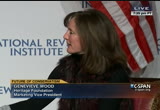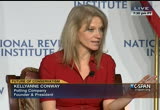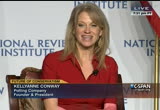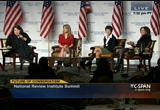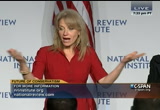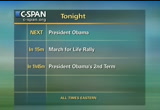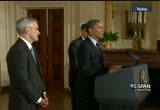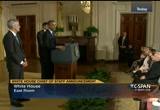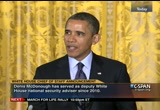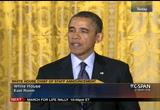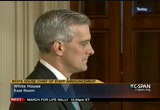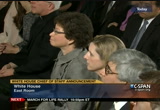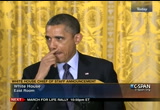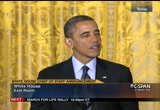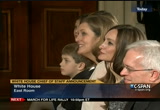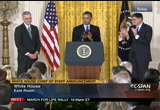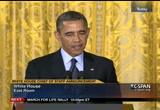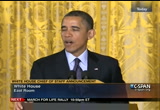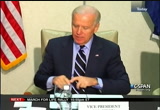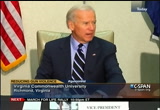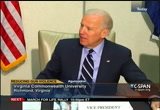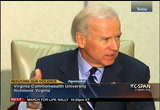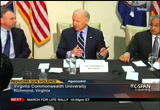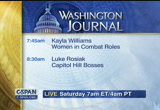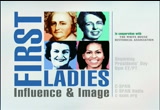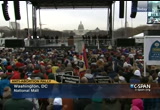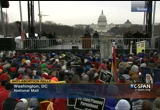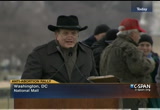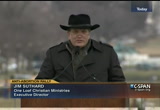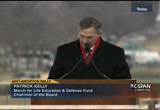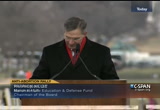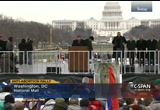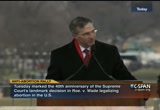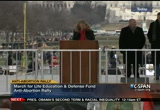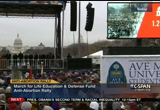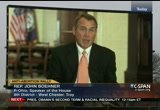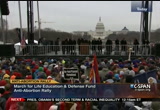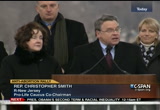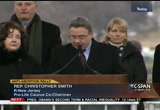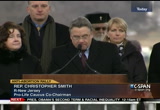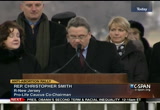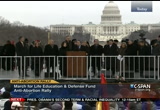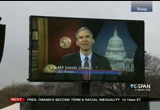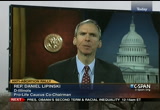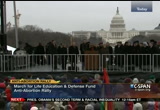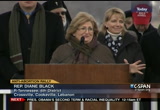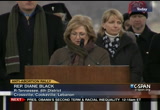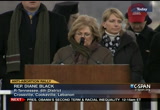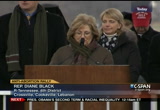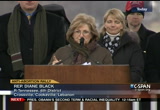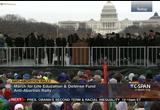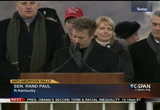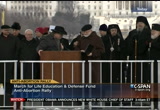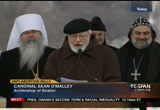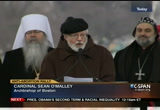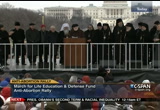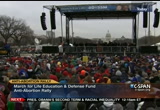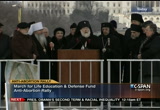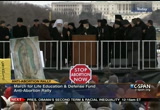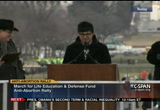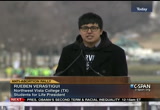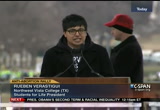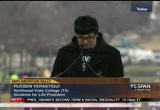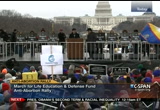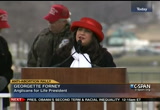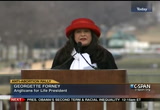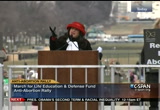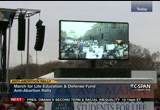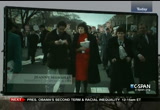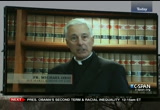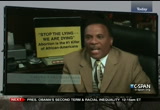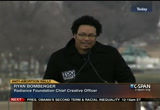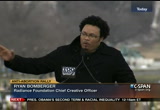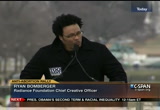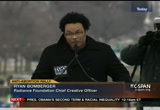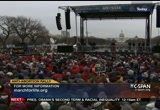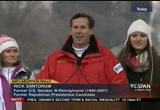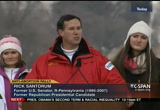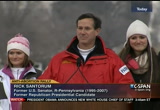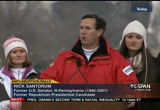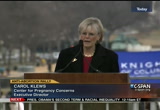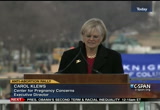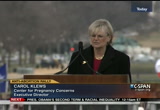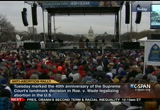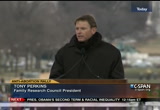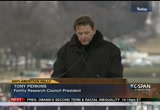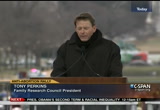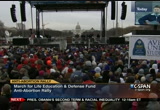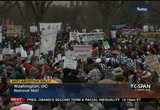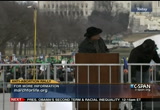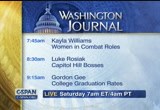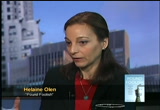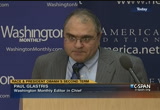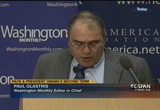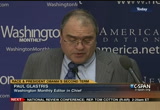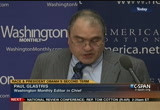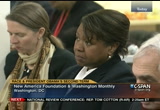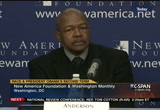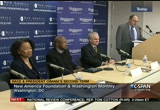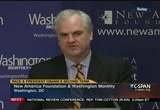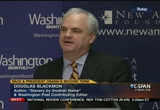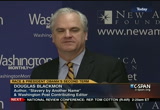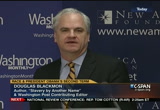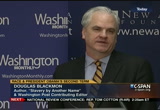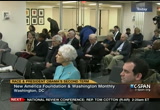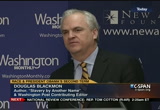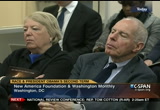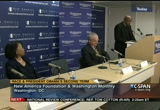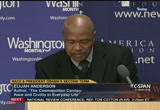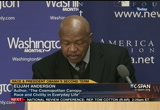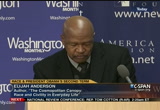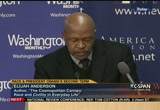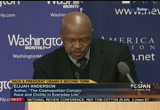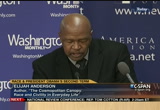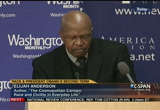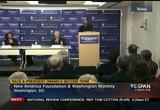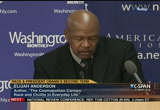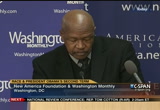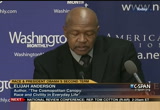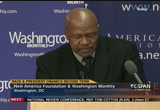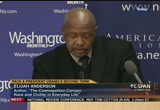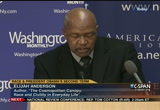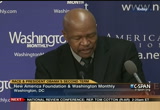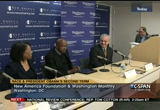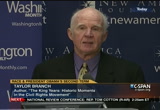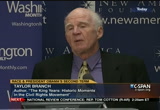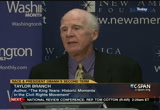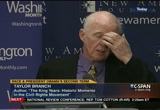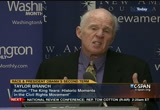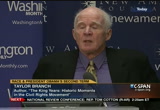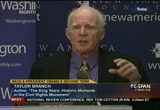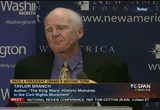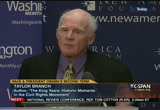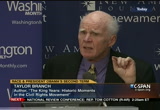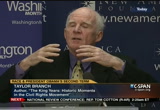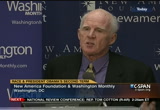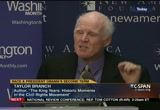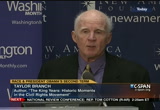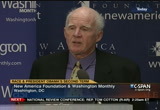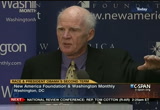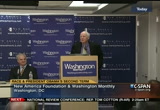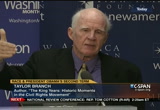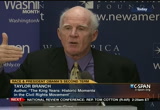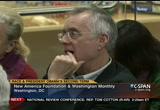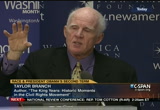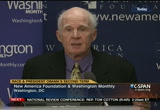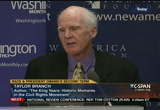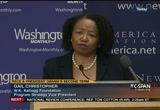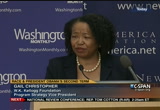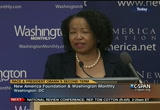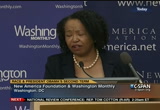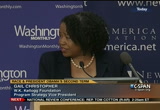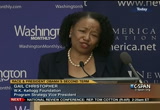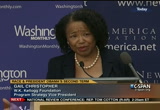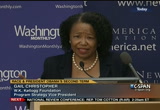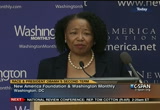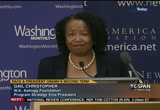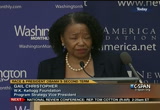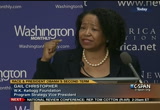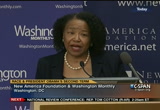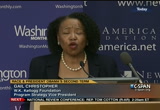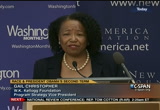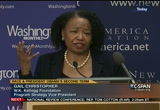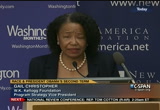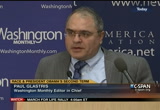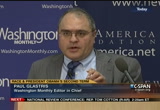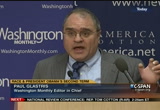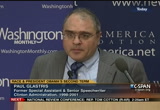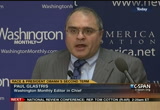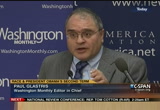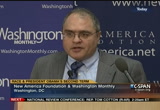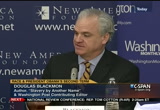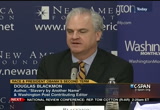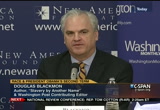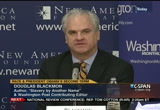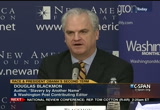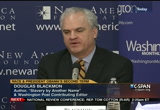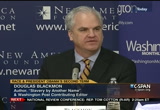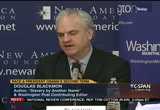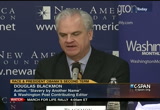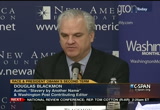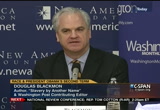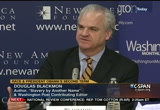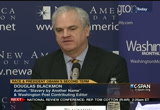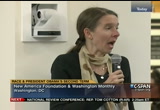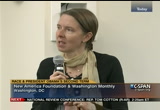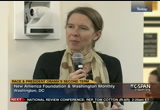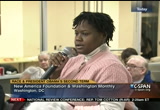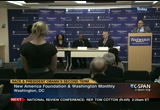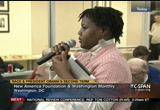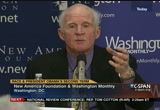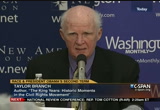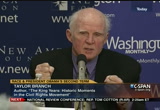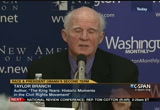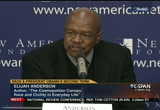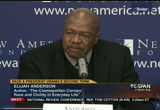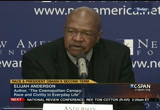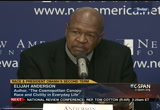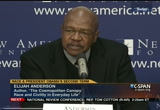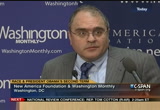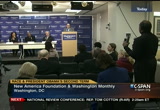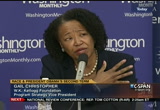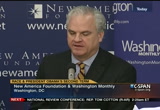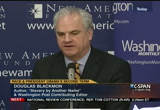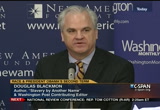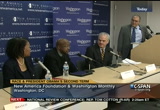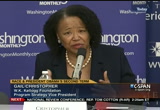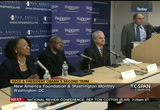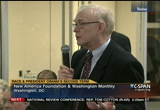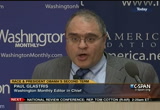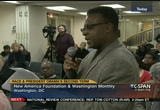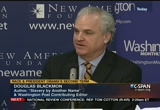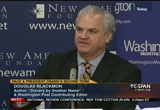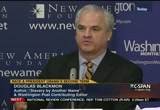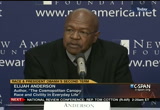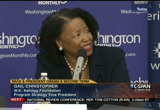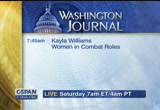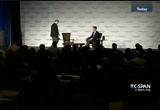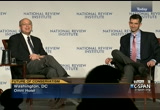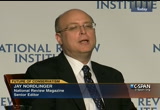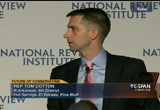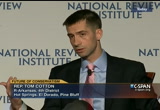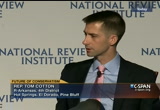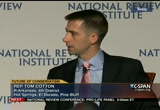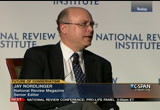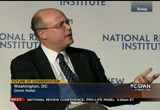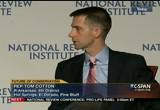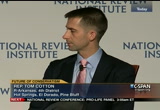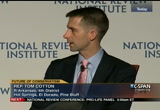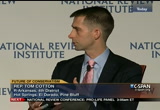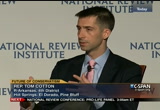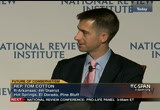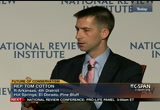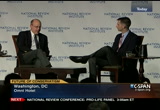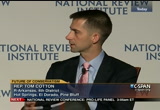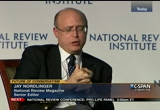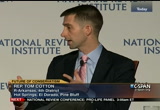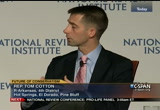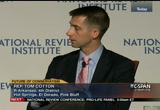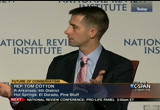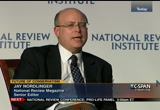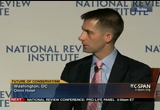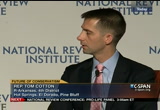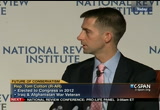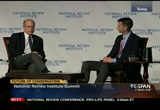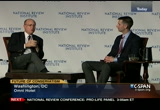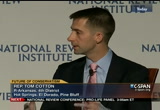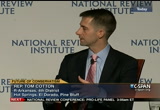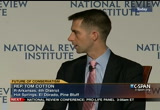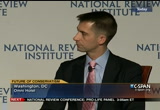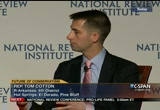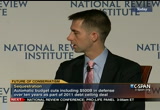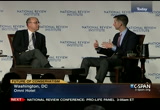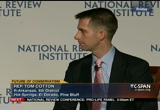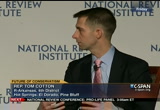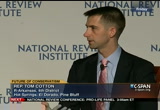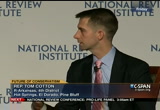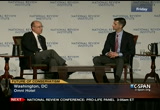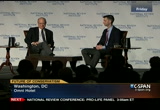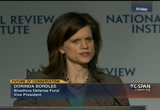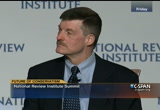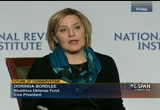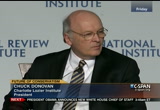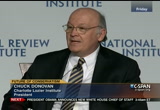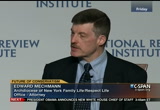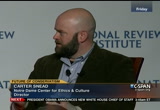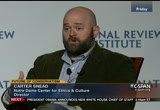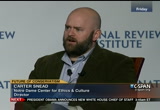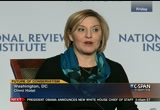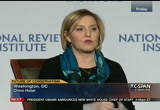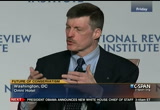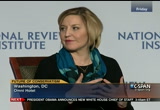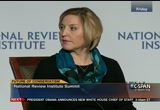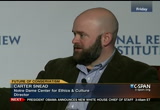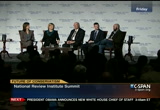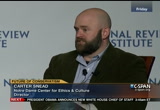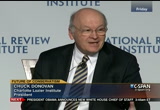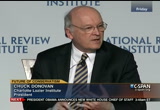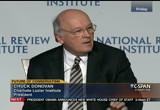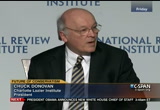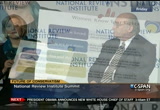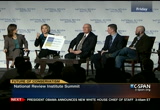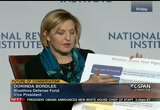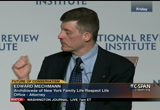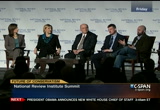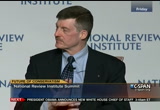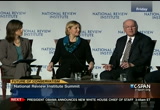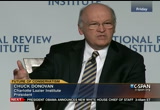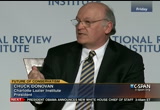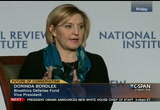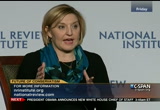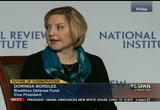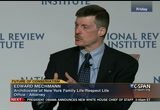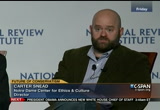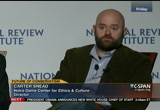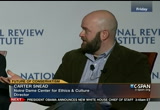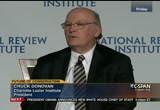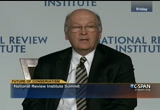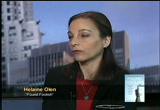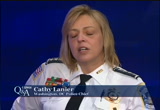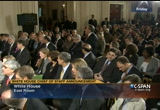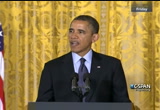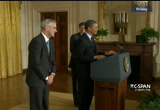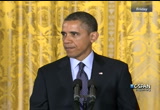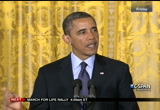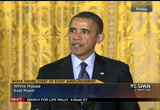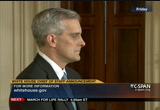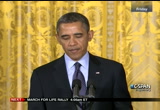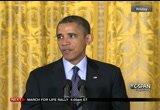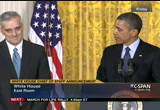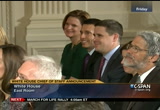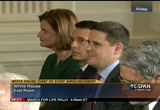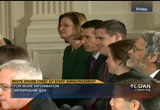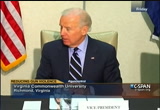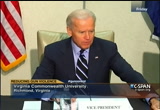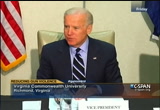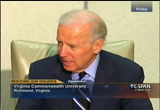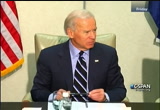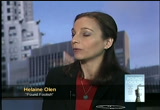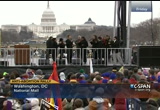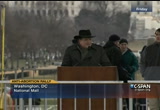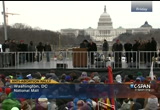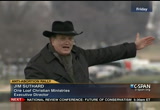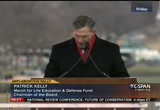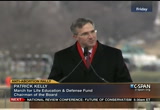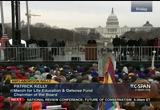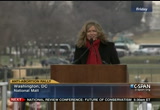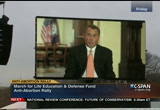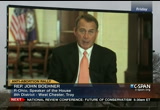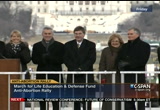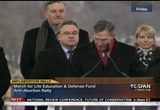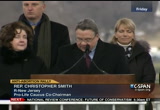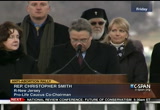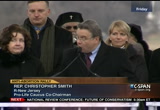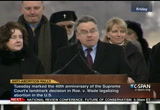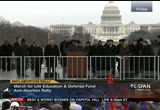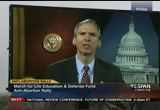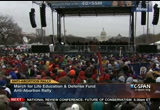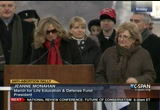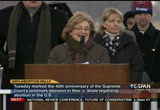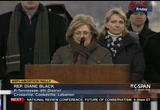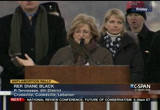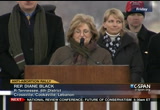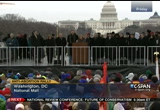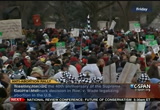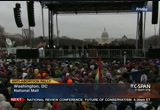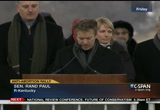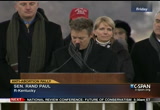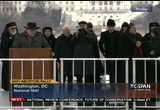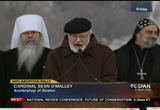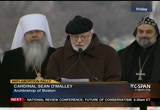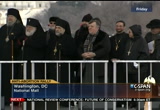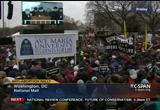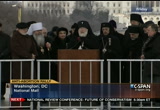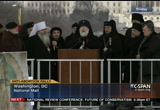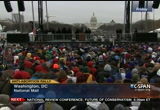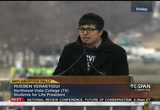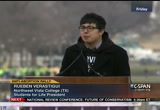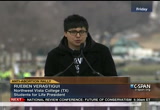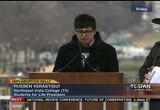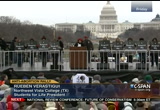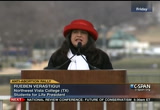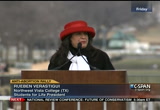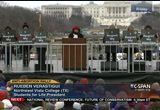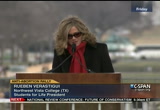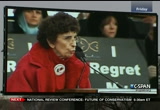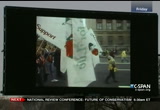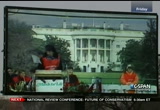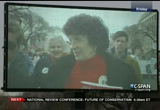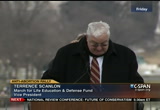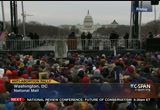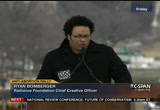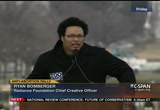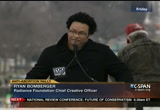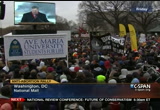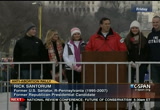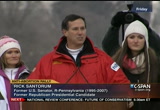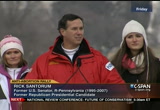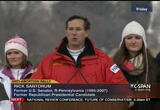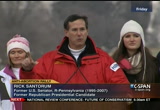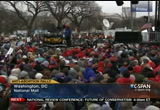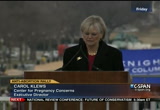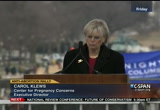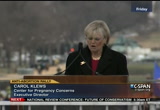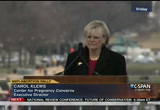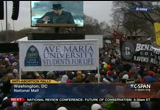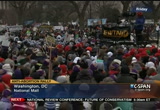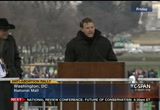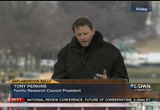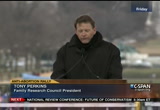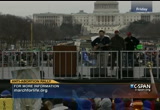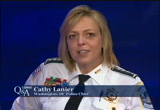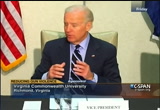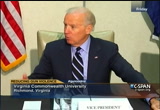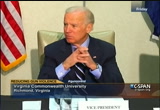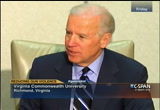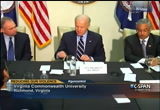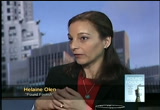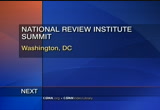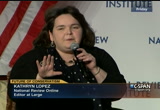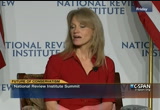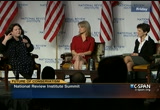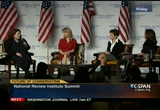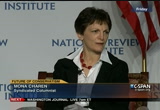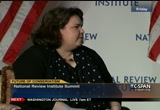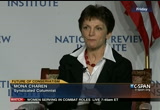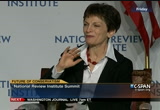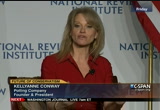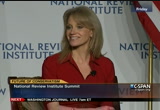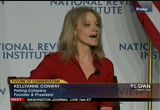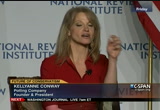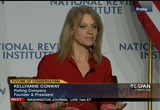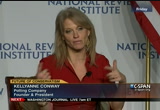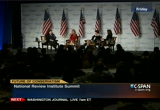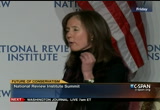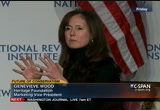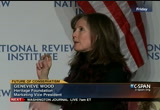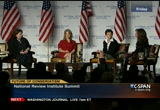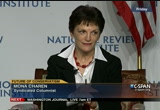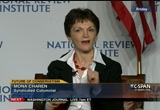tv Politics Public Policy Today CSPAN January 25, 2013 10:30pm-6:00am EST
10:30 pm
what i am concerned about. it was not saying there is absolutely no role for government. these people have to pull themselves up by the bootstraps. i think we can do more and more of telling those stories with a places like national review. we have to highlight the things that work. when people see it, it makes a huge difference as opposed to sterile principle or policy that we may know sounds good, but we want to feel good about it. >> there are two was to message to people, whether they are consumers, voters, your neighbors. shock the conscience is pretty obvious. we always have to have our hair and hands on fire when we talk about something. does not always have to be an anti obama statement. i actually prefer to ignore him more than anything. one day i will wake up and he will not be president.
10:31 pm
i can spend time with people who are useful to advancing the ideas and the belief systems that we have in free market and religious liberties and limited government and the family etc.. what about the warm the heart? that is really important. people say, that will not move of voters. it will actually get them to listen, maybe. i think you see some variation of or a combination of different audiences in consumer and america. i keep going back to that because most people do not wake up and referred to themselves or their upcoming day according to their political ideological association. what are they saying when they wake up? what are they saying?
10:32 pm
they say, i am late for work, i am tired, is it snowing? i am a mother of three. i do not think my business is going to make it. what is it they are saying? by the way, we are supposed to believe that we do not have a solution for everything. again, the individual and his or her community or local structures or support group or religious institutions, they have the solutions. we love to talk a good game about thrift and all of the money wasted in this campaign. we love to talk a good game about the value of the individual and we run around telling them what is best for them. we have to modulate once in a little while, not just top of the content as well. >> on that positive note, thank you everybody for coming tonight and staying solely. -- stating so late. i am supposed to remind you that the breakfast buffet starts at
10:34 pm
>> more from the conservative summit tomorrow with ted cruz and scot walker and joe scarborough. live coverage resumes at 10:35 eastern. coming up, president obama's announcement of chief of staff followed by the march for life rally. later, a discussion about issues in the president's second term. >> c-span, created by america's
10:35 pm
cable companies in 1979 brought to you by your local television provider. >> president obama announced his deputy security adviser denis mcdonough will become the chief of staff. they were accompanied by jack lew. this is about 15 minutes. >> ladies and gentlemen, the president of the united states, accompanied by mr. jacob lew, and mr. denis mcdonough. [applause] >> thank you. thank you, everybody. please, everybody have a seat. good afternoon, everybody, and welcome to the announcement of one of the worst kept secrets in
10:36 pm
washington. [laughter]as president i rely on an extraordinary team of men and women here at the white house every single day, and i rely on my chief of staff to keep up with them and our entire permit, making sure we are all moving in the right direction, they can share my high 40s are being carried carried out, and that our policies are consistent with the commitments that have made to the american people and that are delivering progress to the american people. as i said earlier this month, i could not be more grateful to jack lew for his amazing service, first as our omb director, than at the state department, and ultimately as my chief of staff. as he prepares for confirmation hearings, and the challenge of leading our treasury department, i am pleased to announce my next chief of staff, and a great friend to me, and everybody who works here at the white house, mr. denis mcdonough.
10:37 pm
[applause] [applause] now, i have been counting on dennis for nearly a decade. since i first came to washington, when he helped to set up my senate office. he, you know, was able to show me where the restrooms were, how you passed a bill. i should point out that even then denis had gray hair. i have been trying to catch up to him, but at that time i relied on his intellect and his good judgment and that has
10:38 pm
continued ever since. he is been one of my closest and most trusted advisers. he has been in indispensable member of my national security team as well. he has played a key role in every major national security decision in my presidency, from ending the world in iraq, from winding down the war in afghanistan, to our to natural disasters around the world, to the repeal of don't ask, don't tell, thomas crisis day -- countless crises day and night, and that includes many nights. i begun to think that he liked to pull all-nighters, and the truth is nobody out works denis mcdonough.
10:39 pm
heart of the reason you saw such warmth in applause is in addition to being such a talented and hard worker, he is also a pretty humble guy. too many admirers he is still just a dude from stillwater, minnesota, and given his humility, i think people do not always appreciate the breadth of his experience and the range of his talents. it is precisely because of that determination that i wanted him in this job. as a veteran of capitol hill, where he was mentored by the likes of tom daschle, he understands the importance of reaching across the aisle to deliver results for the american people, whether it is on jobs, the economy, healthcare, reducing the deficit, or addressing climate change. he is respected by leaders of the government, and if you add it all up, i think he is spent most of the last four years leading interagency meetings, hearing people out, listening to them, forging consensus, and making sure policies are implemented and everybody is held accountable. he always holds himself
10:40 pm
accountable first and foremost. it is no easy task, but through it all denis mcdonough does it with class, integrity and thoughtfulness for other people's point of views. he is the consummate public servant, he plays it straight and that is the kind of teamwork that i want in the white house. time and again i have relied on dennis to help in the outreach to our immigrant and faith communities. he understands that in the end our policies and programs are measured in the concrete differences that they make in the lives of fellow human beings and the values that we advance as americans. he insists on knowing for himself the real world impact of the decisions that we make, so away from the cameras without fanfare, he has visited troops in iraq and afghanistan repeating the, hearing their concerns, following up, finding out what they need.
10:41 pm
he travels to walter reed, spending time with wounded warriors, and to know them. then, he comes back to the white house and he gets it done. that is the kind of focus in the carton -- kind of heart that i want in this white house. now, do not get me wrong. dennis can be tough. it probably comes from being one of the 11 children. you have to be tough. two of his sisters are here today, and i know they are just beaming. they could not be more proud of their brother. maybe it comes from his college football days as defensive back under the legendary john galardi. i always tease him and that he made up for modest talents with extraordinary dedication and a high threshold for pain.
10:42 pm
[laughter] this does remind me of the one topic that we will never agree, biking versus bears. -- vikings versus bears, and there's another reason we all love him so much, and that is his decency, his respect for those around him. ask any of the staff that are here today, and they will tell you despite the unbelievable pressures of service at this level, denis mcdonough is still the first to think about a colleague, or write a hand- written note to say thank you, or to ask about your family. that is the spirit that i want in this white house. this, of course, is reflected in his incredible love for his own family, liam, teddy -- i know that dad has been at work a lot during the week and on weekends, and i guarantee he would much rather be with you
10:43 pm
than with me, but the next job he will have will be demanding, two, but the one reason he does this is because he wants to make sure this world is a better place for all of you. dad will probably have to stop riding his bike to work. as chief of staff, i do not think that is allowed. [laughter]he does what he does because he loves and cares for you guys so much and he wants to make sure that the next generation is inheriting the kind of america that we all want, so i am grateful to his entire family for putting up with us. you are not just one of my closest friends, but one of my closest advisers, and mike everybody here, i cannot imagine the white house without you. thank you for signing up for this very, very difficult job, as jack lew will testify.
10:44 pm
i know you will always give it to me straight, as only a friend can, telling me not only what i want to hear, but more importantly, when i need to hear to make the best possible decisions on behalf of the american people. so, for me, michelle, your friends and colleagues that are here today, thank you for taking this assignment. congratulations. [applause] >> i have one other thing to
10:45 pm
add. we made a number of personnel announcements today. there is going to be an incredible team that denis mcdonough will help lead, but i thought i would take the occasion to just embarrass somebody. some of you may know that today is david's last day in the white house. i had to hide this in the end of my remarks because i knew he would not want me to bring it up, so we had some secret squirrel stuff going on here to avoid him thinking that we were going to talk about him, but as many of you know, david has been with me from the very start of this enterprise, running for president. i cannot tell you how lucky i have been to have him manage our campaign back in 2008, then joined the white house during these very challenging last two years. he has built a well-deserved
10:46 pm
reputation as being a numbers genius and, you know, a pretty tough combatant when it comes to politics, but what people do not realize because he does not like to show it is the reason he does this stuff is because he cares deeply about people, justice and making sure everybody gets a shot in life. those values have motivated him to do incredible things come and if it were not for him -- things, and if it were not for him, we would not be as effective as a white house and i probably would not be here. i thought it was worthwhile, even if he does not want us to say it, thank you to david. [applause]
10:47 pm
all right. thank you, everybody. >> vice president joe biden and other members of the cabinet met with people above gun safety today. after was the talk about the discussion. -- after words they talked about the discussion. >> there seem to be a pretty broad discussion, he wanted to make sure that those who under
10:48 pm
the law are able to be constitutionally denied access to a weapon, like somebody who is adjudicated, not cable bill because of the mental capacity and or a convicted felon, and or somebody who has been guilty of domestic violence under the law, they are not allowed to own a weapon. they are able to be denied ownership of a weapon. one of the problems pointed out was there was an adjudication of the gunmen who committed the crime at the virginia tech. he was able to go out and purchase two weapons about one month apart. we talked about the nation of the universal background checks. we talked about making sure that state equipped the system
10:49 pm
that washington has on prohibitive persons on file. so if you go to a gun dealer or dick's sporting goods to buy a weapon, use what your card or this what it and find out if you are part of the prohibited class of people. we talked a lot about that. we also talked a great deal because we have three people, one psychiatrist and two others who have been a great deal of study, behavioral attitudes toward those who commit violent crimes. we talked about the need to expand a mental health capacity across the country. we talked about access, and we talked about resources. it was pointed out that we have an adequate number of trained professionals over all in the
10:50 pm
country. secretary sibelius' spoke to some of the recommendations we made to the president you have seen relative to mental health, mental health. the, the affordable he rejected the affordable care act. -- the affordable care act. we also talked about not just a mass shooting, but got the violence of in the united states. there has been 1200 murders since what happened up in newtown. 1200. it 9000 people last year murdered as a consequence of a weapon, a gun of some sort. we talked about how we deal with that problem overall in our
10:51 pm
cities, counties and our communities. there is some value to having additional law enforcement officers available in the cities and states. that is why the president has proposed to add another 15,000 folks to the cops program. we also talked about the gun safety issue. are we able under the law to train people how to better care for their weapons so they do not get in the wrong hands. we talk about gun trafficking. as mr. hicks pointed out, an awful lot of the crime committed in this city -- when a gun is recovered it is usually a stolen gun or an illegal weapon. we talked about the need for a
10:52 pm
federal trafficking -- of federal gun trafficking legislation. most were what are the recommendations for how we can detect earlier than a later those folks who would have the propensity to engage in the kind of activity that we saw at virginia tech and we saw at columbine. before that we saw in aurora and conn. >> tomorrow, our guest is kayla williams. then a look at the best and worst bosses on capitol hill with luke rosiak. then a discussion about college graduation rates with gordon gee. live at 7:00 eastern on c-span.
10:53 pm
>> i think it is all a revolutionary process. you grow into this role. my sense is you never get comfortable if you're always pushing for change and growth, not just in yourself but the issues that you care about. you are never done. there is never a point in time when you feel like, there. i am now here and i can do this the same way all the time. it is always changing. change given the state of the issues and country, and you never know what they are going to be from one day to the next. you have to be flexible and a fluid and open to evolves. >> the first ladies, their private and public lives. c-span is teaming up with the white house historical association. "first ladies -- influence and image."
10:54 pm
season one begins on president's day at 9:00 eastern. >> anti-abortion activists gathered in washington today for the annual march for life rally that concludes with a march to the supreme court steps. tuesday marked the 40th anniversary of the roe v wade decision. speakers included rick santorum , christopher smith, and rand paul. >> ladies and gentlemen, our national anthem. ♪ [star spangled banner] ♪ ♪
10:56 pm
>> welcome to the march for life, 2013. we hold these truths to be self evident that all human beings, born and pre-born traded equal and were in doubt with certain unalienable rights. among these, the right to life. we have come to stand for the pre born who could not stand for themselves. we have come to celebrate life
10:57 pm
and to boren the million -- to mourn and the millions of babies killed in abortion. we have come to tell the world that abortion is wrong. is the taking of innocent life. it has to stop. it is easevil. having the american heritage that stands for the right to live, we now want to say the pledge of allegiance to our flag. to do this, we are inviting today mr. michael russo who is a grand night of the george washington university knights of columbus. welcome him and let us say the pledge together. the flag is over here. [pledge of allegiance]
10:58 pm
10:59 pm
we have us with -- we have with us that people have stepped up to the plate for new leadership. i want to welcome our new chairman of the board for the march for life, patrick kelly. he has had much experience in various levels of government. he comes to us with a lot of -- patrick, come on over here. i would need to give him a bit of march for life welcome as our new chairman. [cheers and applause] >> thank you for that warm welcome, jim. thank you very much. this year we mourn the passing of a pro life hero, nelly gray. nellie devoted the entire second half of her life to the march for life for which we will always be grateful.
11:00 pm
i truly believe that without her inspired leadership, there would not be a march for life. only standing on her for foundation will do next generation of could a march for life to a new era. a new era of hope and an era of victory. under new leadership, the vision of the march remains the same. to be the world's largest human rights demonstration. to overturn the tragic roe v wade decision and to build a culture of life in this great country. [applause] when i look out at this crowd, i see a culture of life. i see it in the families that have sacrificed to easier today.
11:01 pm
i see in the parishes and the church groups that boarded buses yesterday or very early this morning. but most especially, most especially, i see it in the faces of the tens of thousands of young people who are here today to bear witness to the truth that life is beautiful. [applause]to bear witness to the truth that every human being has a god-given right to life. the march for life has a long tradition of making its voice heard on capitol hill. that tradition continues today. our volunteers are staffing tables and will be in the crowd, handing out postcards, urging the new congress to come together to respect life.
11:02 pm
these take a moment to sign a postcard, and we will make sure that they are delivered to the desks of your elected representatives. next, i have the great privilege and distinct honor of introducing the new president of nee march for life, jeanni monahan. she has worked to build a culture of life throughout the course of her professional career. that has included roles in the field of public policy, and both the government and in a think tank. if you ask her, she will tell you that she is excited and humbled to now be president of the organization that brings together people of all ages, of all faiths, and of all walks of
11:03 pm
life, for what has become the largest and most important civil rights protest in the world. [applause] please join me in welcoming the new president of the march for life, jeanne monahan. [applause] >> thank you. is anybody cold out there? [laughter] it is a little chilly, right? is ok. we are here for a pretty important cause, right? [applause]i can't. . hear you. [applause] today marks a somber moment in our country's history. we remember that 55 million americans have died as a result
11:04 pm
of legalized abortion in the last four decades. 55 million. this makes up about a fix of our current adulation in the united states of america. even the center for disease control and prevention reported that about one in five people are not allowed to live annually in the united states because of abortion. abortion truly is the human rights abuse of today. [applause] and abortion is not good for women. experience, science, and research continue to show what common sense already tells us. abortion takes the life of a baby and wounds its mother and father. it is a somber moment. and yet, i believe that we are seeing signs of hope of a new
11:05 pm
era to come. what do you all think? [applause] we are winning on many fronts. one, the court of public opinion. how many of you know that being pro-life for the last three years is considered the new normal in the united is? -- united states? [applause] it is true. if it is not convincing enough to be here, opinion polls are also telling us that americans are simply becoming more pro life. we are also winning in the states. close you 200 pro-life bills have been enacted in different states around the country in the last three years. [applause] that's right. these laws help women to have as much information as possible before making such a decision as abortion. did they get parents involved.
11:06 pm
they hold abortion clinics to the same standards that other locations oohing similar surgeries are held to. they are not only pro-life laws , they are truly pro-women. but there is another thing i really want to talk about. that is that, most importantly, we are winning with young people. [applause]we see it here in the march, i see it here right in front of me. we see it in the polling. your generation is a pro-life generation. [applause] i have a message for you young people. i have a few things i want to save separately to you. let capitol hill now. let the media know. let the president know, let your culture know how you feel about abortion. [applause]
11:07 pm
i promise you, we at the march for life are going to do everything possible to let your voice he heard. we know that you are the pro- life america. we all have a role to build and making a culture of life. i challenge each of you in a acidic way -- specific way, think and take some time reflecting about how god wants to use each of you to bring a speedy end to the human rights abuse of abortion. you promised me? [applause]good. i am also going to take a minute to challenge the adult, then i will finish up areas we also you need you to give an offer of ways. one of the ways is financially we need the resources to continue fighting the human rights abuse of today. you can donate in a number of different ways. you concede any of our knights of columbus volunteers.
11:08 pm
we have notre dame students. you can visit our new and updated website, marchforlife. org. if we all do our part, give till it hurts, our money, our time, our energies, in whatever way god is calling you, we will together bring the human rights of the use of abortion to a speedy end. [applause] it is in your hands. it is in my hands. we are all called to do our part. now i will turn it over to somebody who has done his part. it is my privilege to introduce, by video, the speaker of the house, john boehner. [applause] originally from ohio, speaker boehner serves now as the leader of the united states house of representatives. elected to represent the eighth congressional district of ohio, for a 12 term in november 2012, the speaker is a national leader in the drive for a smaller, less astley and more
11:09 pm
accountable federal government. as importantly, he is an ardent row lifer. -- pro-lifer. x hello everyone. thank you for being here in our nation's capital on the 40th anniversary of roe versus wade. cannot think about a march for life without nellie gray. she was the leading voice. for those who did not have one. now, it is up to us to be her voice. to commit ourselves to do all we can to protect the same to the of life -- sanctity of life. that means bringing together a bipartisan pro-life majority and getting to work. in accordance to the will of the people, we will work the past. defending life is much more than just voting the right way or saying the right things. it is about promoting the culture of life. it is about understanding that
11:10 pm
abortion is defining human rights as the issue of our times. because human life is not an economic or political commodity. no government on earth has the right to treat it as such. that's take -- it is becoming more important to us to share the truth with our young people and encourage them to lock arms, speak up for life, and make abortion a relic of the past. but that the one of our most fundamental goals this year. for now, let me thank all of you for what you do. may god bless your efforts and may god bless the united states of america. [applause] >> we thank figure dinner for his leadership and for sharing his dots with us today. -- speaker aynboehner for his leadership and for sharing his
11:11 pm
thoughts with us today. with us on stage, andy harris of maryland. bob from the great state of ohio. representative diane black from tennessee. teeth from pennsylvania. -- keith from pennsylvania. we have brad and his wife monica from ohio. we have tom rooney from florida. glenn thompson from the great state of pennsylvania. wagner from misery. -- missouri. also, to share remarks with us this afternoon, i am very happy to introduce representative
11:12 pm
chris smith of new jersey. [applause] chris smith is the chairman of the congressional pro-life caucus and has served in that role for over 26 years and has been a leader in the advancement of numerous pro-life legislative initiatives. he is the chairman of the house subcommittee on human rights, and the former director of new jersey right to life. these join me in welcoming chris smith. [applause] >> thank you very much, patrick. it is an honor for my wife and i to be here among you. and to be surrounded by men and women come up members congress, who tenaciously fight and defend basic fundamental human rights, especially the right to life. it is great to be with them and to you. 40 years ago this past tuesday, mike the us bank -- marks the
11:13 pm
u.s. supreme court abandonment of women and babies to the abortionists. 40 years of victims. dead babies, wounded with him and shattered families. 40 years of government sanctioned violence against women and children. since 1973, more than 55 million children have been killed by abortion. a staggering loss of children's russia slides -- precious lives. a death toll that compares to the entire population of england. this is not change the fact that abortion is a serious, legal violation of fundamental human rights. women and children deserve better. the demands of justice, generosity, and compassion require that the right to life be guaranteed to everyone. [applause]
11:14 pm
rather than dull our to the unmitigated violence of abortion, the passage of time has only enabled us to see and better understand the innate cruelty of abortion. and it's horrific legacy, victims, while making us more determined than ever to protect the weakest and most vulnerable. in his inaugural speech, president obama said, together we can resolve that a great nation must care for the vulnerable. that all are created equal. and that our journey is not complete until all of our children are cared for and cherished and always safe from harm. indeed, mr. president, we must care for the vulnerable. that also includes unborn children and their mothers. [applause] no one gets left behind.
11:15 pm
no one gets left out. all people are created equal. our journey is not complete until all of our children, including the child in the room, are cared for and cherished and always safe from harm. yet president obama systematically and aggressively promotes abortion at home and overseas. despite the fact that taxpayers subsidize land parenthood -- planned parenthood, it remains president obama's favorite organization. how tragic. [booing] sunday, future generations will look back on america and wonder how and why such a inanely and lichen society could have failed to protect the innocent -- enlightened societyan
11:16 pm
could fail to protect the innocent. how a noble peace president could have simultaneously been the abortion president. know this, we will never quit. [applause] our adversity, our faith and trust in god is tested. it also deepens and overcomes and forges and indomitable spirit. know this, the pro-life movement is comprised of noble, caring, smart, and selfless people. a powerful human rights struggle that is growing and human support, intensity, commitment, and hope. and know this, the pro-life movement is not only on the side of compassion, justice, and inclusion, we are on the right
11:17 pm
side of responsible science and of history. god bless you, everyone. [applause] >> thank you, congressman. god bless him for standing up for the defenseless pre-born children. we now have a message by video of the cochair with congressman smith of the pro life caucus. congressman daniel lapinski. he is a courageous man. he is a democrat from illinois. >> good afternoon. thank you for being here. at this place, great speeches have been made and millions have marched to secure our god-given unalienable rights. tragically, the 40th
11:18 pm
anniversary of the taking away of our most basic and essential rights from our most vulnerable sisters and mothers. we cannot allow sorrow and setbacks to stop us. we must stand together proudly and courageously for life. we dedicate ourselves to prayer and action to protect life. there are legislative battles to be fought. i will continue to fight them as a pro-life democrat. because life should not be a partisan issue. we all must also be committed to changing hearts and minds. along with caring for mothers and their babies, as so many of us do. and all of this, we will do it with boldness and with love. every year, i am uplifted by your participation in the march for life. with hard work and god's grace, we will move our nation away from the culture of death to embrace the right to life for all. god bless you and god bless
11:19 pm
america. [applause] >> there are many great pro- life legislators who are working together to build a culture of life and to change our nation possibly want to reflect the dignity of every human person. many of them have joined us today and posted different endorsements on our website. time alone prevents us from hearing the great work of all these members of congress. we've still will continue to hear from one or two more. i am very excited to introduce congresswoman diane black. as a nurse for over 40 years, she has spent her career protecting life. as her role in a state legislator, she has led the fight to restore respect for
11:20 pm
all human life. as a healthcare professional, she knows that a nation that has a pro-life law as its underpinnings is a nation that respects and supports good and meaningful health care for women. congressman black is an active member of the pro-life caucus, the house values action team and serves as vice chairman of the houses gop dr. caucus. with that, please hear her remarks. [applause] >> thank you so much. i am so inspired by the crowd that is here today. when the supreme court made the decision 40 years ago, they certainly did not do x any favors. they certainly did not do us any favors by doing it in january. despite that, the threat of snow and ice did not to chew
11:21 pm
away. thank you so much for being here today. [applause] on january 22, 1973, the date the supreme court handed down a ruling on rover sway -- roe versus wade, i was working at an emergency room in baltimore. this was a time he was still not widely accepted for women to pursue a career outside the home or own a business or run for elected office. have madeose inroads towards tender equality, abortion on demand continues to undermine the freedom and the justice that generations of women have fought for. the reality is, 40 years ago, after row the wade -- roe v wa de, one third of my doctors and granddaughters peers are not here today to benefit from the progress we have made and share in the hopes entrance of the future. as martin luther king jr. once
11:22 pm
said, injustice anywhere is a threat to just us everywhere. -- justice everywhere. for decades, pro-abortion activists have perpetrated lies about abortion particularly to women. my number 1 -- we have been told that abortion is merely a means of female liberation justice and empowerment. hitting mothers against the unborn is not liberating. it is a horrible injustice that, in the last 40 years, has resulted in 55 -- 55 million aborted babies whose mothers have gone on to live with severe physical, emotional, mental, and spiritual scars. women who have had abortions are 30% more likely to face emotional and mental problems. they are 40% more likely to have
11:23 pm
a premature birth. and three times more likely to experience drug and alcohol problems during their lifetime. such lies cannot continue. my number two, we have been told that abortion is about choice. in reality, abortion is a false choice. abortion leads to death of a child. robbing society of its future mothers and fathers, nurses, doctors, teachers. a choice to take what is not ours to take. life of another person. it is not a choice at all. it is a mistake. [applause] lie number three, we have been told the lie that a fetus is not a life. you know what's, medical advances have confirmed that many of us knew in our hearts and that decision was made so many years ago. the fetus is living inside a
11:24 pm
woman's body is not a mob of tissue, it is a human being. [applause] a baby who has a right to life, just like you and me. today, 40 years after roe v wade, while i am still a registered nurse, my fight for life has shifted from the emergency room to the tennessee state capital to the halls of congress. i am committed to using whatever opportunities and power influence that my current position affords me to protect and defend the sanctity of life. [applause] one way i have done in my current efforts is to fund the largest abortion provider in america, also known as planned parenthood. you probably already know this, but
11:25 pm
according to the recent report from them, they have provided 300 abortions just in this last year. in other words, one abortion every 94 seconds. you know what? taxpayers money has unwittingly helped foot the bill for this. planned parenthood receives more than one half billion taxpayer dollars annually. or what is intended to be women's health money. it badly misuses this money to subsidize a big abortion business. that is why, at the start of this new year, with the blessing of my good friends and your good friend, congressman mike about who is the governor of indiana, -- yes, he deserves a big round of applause. he has thought for so many years, and has handed me over at the title x abortion provider prohibition act. if signed into law, my bill
11:26 pm
would ensure that the title x federal grants are used for their intended purpose. strengthening families and providing critical health services for women. it would bar those dollars from growing to organizations that divide -- provide abortions. on this anniversary, we remember those tens of millions of babies who will never be able to celebrate a birthday, we will not go to college, who will not contribute their god-given talents in this world, and our thoughts and prayers are with those countless men and women whose lives have been forever changed by the violence of abortion. today, we press on. the fight for life and the hope that one day we will live in a country where each and every life, born and unborn, is respected, valued, and given the opportunity to pursue their dreams. god bless your efforts. thank you so much for what you
11:27 pm
do. [applause] >> thank you. we are also fortunate to have the support of courageous pro- life members of the u.s. senate. our next feature that -- speaker is one such delicate. rand paul is never afraid to stand up and speak up fearlessly for the record the unborn, without exception and without compromise. dr. paul brings us more than two decades of experience in medicine to all of his works to advance the culture of life. please welcome to the stage, senator rand paul of kentucky. [applause] >> thank you. thank you. i have a question. i have a question for those who don't respect and won't protect
11:28 pm
life. can a nation long and/or that does not respect the sanctity of life? can a nation conceived in liberty carried its head high and 50 nice protection to youngest and most vulnerable of the dozens -- vulnerable of its citizens? can we continue to thrive without understanding that life is a precious if from our creator? i believe that great nations and great civilizations spring from a people who have a moral compass. our nation is addressed. adrift in the wilderness -- adrift. adrift in the wilderness where right and wrong are subservient to the hedonism of the moment. our country is in need of a revival. [applause]
11:29 pm
i believe our country is in need of a virtual cleansing. -- spiritual cleansing. i have looked into the eyes of one pound babies. i have cradled their bodies in the palm of one hand. i defy those who are careless, who would disregard life, i defy them to come to the needle -- neonatal nursery with me and look at these tiny miracles and say, we are not going to protect that. we all want change. we march today for change. but change will only become when we begin to change attitudes. we must preach a gospel so full of compassion. so full of justice. it cannot be resisted. then and only then will the log protect the innocent. thank you, and god bless america. [applause]
11:30 pm
>> we have a little delay. we have a priest that has been coming for 40 years to the march for life. when you first came, he was father o'malley. he was very helpful in getting the early days of the march. he was right by nelly hoss side. side.ellie's now he is the archbishop of boston. proclaiming life. he is coming to invite god's presence on all that we say and do today. with his brother, roman catholic and eastern orthodox bishops and syrian orthodox bishops -- brother o'malley. [applause] >> thank you.
11:31 pm
my dear friends, let me share with you a tweet that we just received from hope that addicts to 16. -- pope benedict 16. the holy father writes, i join all those marching for life from afar. and i pray that political leaders will protect the unborn and promotes the culture of life. benedict the 16th is with us. [applause] my dear friends, on behalf of the united states conference of catholic bishops, the orthodox bishops of the united states, and all people of good faith to join us in advocacy for the
11:32 pm
unborn, i am pleased to join you in the beginning of this 2013 march for life. as we begin, we remember nellie gray. 40 years ago, many people thought that the opposition to abortion would eventually disappear. that people would come to accept abortion and the diehards who opposed abortion would eventually give up or die off. nellie gray was not about to allow that to happen. the march has grown stronger and stronger each year. today, we make the commitment to continue the mission she has established, as we witness the dignity of life and call for the protection of the unborn. we are confident that nellie is praying for us from her place in eternity. this year, we continue our new tradition of the orthodox and roman catholic bishops joining together in prayer at the beginning of the march as a
11:33 pm
historic sign of unity for our efforts to uphold and defend the sacredness of all human life. i welcome our orthodox brethren this morning and express -- [applause] and express the gratitude of the u.s. catholic bishops for your presence. in particular, we welcome his eminence metropolitan alexis. and one who was not able to be with us today, he joins us with his prayers as the metropolitan of boston. welcome, brothers. whathank you for being here. [applause] let us pray.
11:34 pm
oh god, our creator, all life is in your hands from conception until death. help us to cherish our children and to reverence the privilege of participating in the gift of bringing human life into the world. may all people live and die with dignity and love, always assisted by our care, concern, and compassion. let's all those who defend the rights of the unborn, the handicapped and the aged. in light in the hearts and minds of do not recognize the sanctity and dignity of each and every moment of life and help them to gain new awareness and respect for these sacred gifts. let freedom be tempered by responsibility, integrity, and morality as we go forth to carry out the mission that has been given to us by christ, our lord. now, i invite the orthodox bishops to intone their song,
11:35 pm
11:37 pm
my friend, come up here. this movement has a lot of young people these days involved. there is a hold, the future of the collective movement. they will see the end portion. they will bring it. i want to introduce to you a young man who is part of this organization that his college. he is the president of the northwest vista college students for life. his first name is ruben, but i will not say his last name because acute messing it up. god bless him. give him a warm welcome. [applause] >> i am so amazingly blessed to be here today, with all of you, representing the use of the less movement. [applause]-- theyouth of the
11:38 pm
pro-life movement. we are the generation that has been led to believe that the killing of innocent pre-born children is ok. how many of us are missing brothers, sisters, cousins, friends, because of abortion? how many people are missing here today that should be joining us, marching down the streets, but are not because of abortion? more than one third of our generation has been aborted. and we have not been fooled. we know what abortion is. we have seen the procedures. we have seen the graphic images. and we have seen our brothers and sisters through ultrasounds. we cannot just sit around anymore and wait for change to happen. we need to get out.
11:39 pm
we need to get out there and make change happen. [applause] i truly believe that we are the chosen generation and we will abolish abortion and change history. [applause] the youth of the pro-life movement gets worked over a lot, people think just because we are young, we do not know what we are talking about. it is time that we show people that we do know what we are talking about. and we will not be silenced. [applause] right now, we have a chance to develop our skills. to be great pro-life leaders, not just in this movement, but in our high school and college campuses. [applause] it is important to get involved and start strong pro-life group in our schools and the an example to our peers.
11:40 pm
sometimes it will feel like we are alone on our campus. that we are the only ones fighting for this movement. take a second and look around you right now. look all the way back there. we are not alone. and people will stand with you. [applause] as the pro-abortion movement gets older and older, fearing that they might lose, the pro- life movement gets younger. we are winning this battle. we will continue to fight until abortion is abolished. [applause] we have to remember, we are not the future of the pro-life movement treated we are the group -- of the pro-life movement. we are the pro-life movement. anne frank once wrote, how wonderful it is that no one need wait a single moment before starting to improve the world.
11:41 pm
she wrote the truth. with that, in front of all of you, i say that i will dedicate my life to the pro-life movement, to see that abortion is abolished. [applause] i really hope that you can join me. with all of us, we can truly change and save lives and our campuses, our cities, our states, and our nation. my name is rueben verastigui. i am 19 years old. i am a student for life and i and the pro-life generation. [applause] [speaking spanish] everything is possible with god. thank you. [applause] >> and they are the hope of our nation. i want to introduce to you the president of americans for life
11:42 pm
and a cofounder of roe no more. -- what did i say? is silent no more. georgette forney. >> it is an honor to be here speaking before you on behalf of my brothers and sisters who are silent no more. silent no more is a campaign to raise awareness about the truth of what abortion does to men and women. in addition to our children dying, a part of us die right along with them. silenced no more is cosponsored by two fabulous organizations. anglicans for life and priests for life. janet is my cofounder and sister in this effort. and father frank is our pastoral director. [applause] we work tirelessly throughout the year with three women and
11:43 pm
men that stands behind me. they represent over 14,000 women and men who have joined the silent no more awareness campaign. to say, let's talk about abortion. not from a political perspective, not from a legal perspective, but from a personal perspective. because we know you painful reality. this product is inferior. it does not have a good ending. it must be recalled. we must end portion. and we must help women find healing. we must help men find healing. and we must help women who are pregnant be able to keep their children. and parents and adopt. we stand here today because we found healing. i have to tell you, if somebody told me 20 years ago that i would stand in front of a group of pro-life people and tell them
11:44 pm
about my abortion, i would have said, no way. i would have expected to have been stoned and have things thrown at me. but the pro-life immunity has embraced us. they have offered us healing and forgiveness and support. the other side has not. [applause] thank you. the other side says, it is not a baby. you can have another baby. they did not acknowledge our pain. our pain deserves to be acknowledged. our pain has been received by christ. the cross has covered up. -- us. we stand here with our i regret my abortion signs, so that any woman or man that is here today that hears my voice, that is watching this, and they have been involved in an abortion, they have lost a child to abortion, they need to know -- you need to know, stealing is available.
11:45 pm
resources are out there. we have received abortion forgiveness and we are here to be that witness for you. we want to reach out to you with abortion forgiveness as well. therefore, we invite you to visit our website, abortionfor giveness.rorg. these share that website. share that website so that you can -- it is a search engine. you can find resources for help. we are silent no more and we want you to join us and know the love of christ. god bless you. [applause] >> thank you, georgette. they truly have the right to say that abortion is not good for women. as we know, we lost our great leader nellie gray. of nearly 40rts
11:46 pm
years to build a culture of life in this country are evidenced by all of you here today. and by the force and the strength of the pro-life movement. at first, nellie thought we would only need one march. she never expected we would be back here 40 years later. nor that this would be the largest pro-life event in the world. [applause] when she realized that she needed to push forward, she literally took the george and led the charge. -- torch and led the charge. we now present the video of the memory of nellie gray. >> our next guest did not want to be honored. she likes to say, we have not won anything yet. we recognize her for continuing to organize and operate the largest civil rights event in the world.
11:47 pm
>> nellie said, if you cannot allow a little bit of abortion anymore than you can allow a little bit of murder. >> she was a tyler's advocate of the unborn child. no compromise, no exceptions. >> she never wavered. she was always loving and showed great respect for every human being. >> she was a woman of faith and conviction who was called by god. she responded to that call with full hearted fidelity. >> nellie gray was a warrior. her efforts, even into her 80's. >> nellie was a truly principled woman. even if it meant great personal suffering in her life. >> nellie was the real
11:48 pm
renaissance woman. >> nellie gray and the march for life or synonymous. she would not stop, she would not let go. once you grab something, she would not let go. nellie's message was clear, unambiguous and profoundly pro- life. >> we are so thankful for the legacy she has left us in the national march for life. >> she was really the person who saw the youth coming out in the pro-life movement. >> she was the backbone that consistently kept pro-life cause a life -- alive and vibrant. >> she really cared about the dignity of women. >> you will never know how many children and people are here today because of her work.
11:49 pm
>> there is no one in the pro- life movement with more dedication -- she gave her whole life. >> nellie gray reminded us all mock every person has a right to life. our goal needs to be to reserve and guard and protect that. >> we are now closer to our goal, thanks, in part, to this great lady, nellie gray. our joan of arc of the gospel of life. >> we pray today for the soul of nellie. ray for us. pray for us as we press forward. running forward, forward, always forward for life. >> thank you for being a no exceptions, no compromise. >> when we put this together, without i was going to be one march. then we realized, congress was
11:50 pm
not going to help. and we better have a second march. and what i am saying to you is, we will be her until we overturn roe versus wade. and believe me, we are going to overturn roe versus aid. -- wade. >> god bless you, nellie gray. we miss you, but we know you are praying for us today. i want to introduce you to terry scanlon, the vice president of march for life. he will introduce you to these wonderful student contest winners. >> thank you very much. nellie gray, who you just saw, her leadership inspired millions of americans to stand up for the unborn. nellie's example of leadership
11:51 pm
is a model for everyone here. this year, we asked middle school and high school students to reflect on pro-life leadership and submit essays, poems, and short stories of true pro-life leaders for their generation. on my left, the middle school division as a winner, kaitlyn. [applause] from willoughby hill, ohio. the pelham manor for middle school, calvin -- the colupoem winner for middle school, calvin. the poster, middle school division winner is rachel, right. -- rachel conroy from missouri.
11:52 pm
i cannot recall ever having two students from one school win in this contest. congratulations to both of you. in the high school division to my right, the essay winner bethany from norwood, ohio. the pollen -- poem, mary margaret from waynesville, ohio. and the poster for the high school division, rebecca from columbia, maryland. [applause] thank you very much. >> i want to introduce to you an incredible young man who has quite a story. his mother conceived him through
11:53 pm
rape and he had a courageous biological mother who took steps to keep him, to bring him to birth, and she has gone on to be an advocate for life in this nation. i want to introduce to you this young man, ryan bomberger, of the radiance foundation. ryan, come join us. god bless you. you know, before the rally, there were some wonderful sparks up on the big screen. ryan was responsible for a lot of that. >> how does it feel to be pro- life? yeah. exactly. it might be 20 degrees, but it has not put out this fire. let me just tell you it breaks
11:54 pm
my heart to see and snow -- k now, that planned parenthood crushes purpose 1000 times a day. 300,000 human lives are extinguished under the guise of choice. my amazing wife bethany and i started the radiance foundation and launched an initiative called too many aborted.com. -- toomanyaborted.com. the answer, actually, is that one is too many. can i get an amen? there you go. my biological mom had the and exploitable courage to go through nine months of eight somatic pregnancy. -- a traumatic pregnancy. when the purposes emblazoned on on our hearts at the moment of conception. the circumstance does not
11:55 pm
matter. [applause] my biological mom went through nine months, but she chose adoption for me. i was adopted and loved like crazy. i was adopted into a normal american family of 15. i have six brothers. and six sisters. 10 of us our adopted. loved by two parents who understood one thing, the adoption unleashes purpose. [applause] my amazing parents, i just have to send some love out to them, henry and andrea. they never ask for accolades. they never ask for praise. but they are to the parents who love children. but the world said were unplanned, unwanted and unloved. let me tell you, that is a lie from the pit of hell. [applause] here we are today with a president that, sadly, is very
11:56 pm
pro-abortion. a president whose possibility has been tremendously realized. she should be the one championing the fight defending all life. you know, i look at one of my childhood heroes, frederick douglass. the abolitionists. one of the greatest orators of our day. frederick douglass was also born of rape. you know which president whose conscience he was able to reshape? president lincoln. [applause] one of the greatest presidents in american history. i just hope somehow, someway, another person born of rape may just be able to reshape the t.nscience of president obam it is never too late for true hope and true change. and then, bless you. the pro-life generation. god bless. [applause]
11:57 pm
>> thank you for that inspiring talk. prenatal diagnosis may help a family be prepared to welcome a child into the world that may have special needs. unfortunately, when some families hear their child may be born with a special needs, they choose to abort their child instead of welcoming him or her into the world. our next speaker and his family is one who has chosen life, despite a prenatal diagnosis that showed their daughter would be born with a defect. rick santorum was -- [applause] rick santorum was a constant advocate for a culture of life. as the leading contender for his party's presidential nomination in 2012, he was outspoken in his support for pro-life laws in for an end to
11:58 pm
abortion. as he travels the country, he has been a voice for the voiceless and a tireless pro- life advocate. klees joined me in welcoming senator rick santorum. [applause] >> thank you. thank you very much. thank you ray much. thank you so much. for being here today. for standing here in the cold. to give the sense of warmth to this city that is a cold city these days. a sense of warmth of god's love for all of his children. thank you for being here. god bless you for being here. [applause] i want to pick up on what patrick said and thank you for that introduction, you might notice, i do not travel much without some of the family here. karen is here and our -- several of our children are
11:59 pm
here. as you mentioned, one of our little ones is not here. she made quite an impression on his country as a result of the race we were involved in last year. he had to take a break from the campaign, because ella, our youngest, got very ill. it forced us to violate the privacy that we wanted to keep around her and let people know who she was. i have to tell you, the response was amazing. the response to this little girl and the struggles she was going through and who she was. the outpouring of prayer and support was just amazing to us. and it affirmed to us the goodness clacks it affirmed to was the goodness of the people in this country. this country is in search of
12:00 am
truth. they're not finding much in washington, d.c. what we saw from our little girl, little girl we were encouraged to abort -- we were encouraged to abort her because she was going to be saddled with disabilities and it would be better for her. we all know that death is never better. never better. what it is about is that it would be easier for us, not better for her. i am here to tell you, each one of these children, and my wife for sure would tell you, that bella is better for us, and we are better because of her. [applause] gives the sport children -- give these poor children, who if
12:01 am
discovered to have a disability, they are aborted -- please give them a chance. welcome them into your homes as you hear welcome them into our human family. ladies and gentlemen, bella makes us better. bella has made people that she has touched in this country better. she is joyful, she is sweet, she is all about love, and that fits so well here today. this movement is not a bunch of moralizers preaching what it is -- what is rice. it is a bunch of people who go out every day and open up their arms and stand in front of abortion clinics in the cold, who go to a crisis pregnancy centers every day, they reach out their hands in love for little children and for moms and
12:02 am
dads and everyone who in a culture of death have to make it -- critical decisions about life. your the voice of the voiceless. your those that stand for loved in a world of death. we are proud to be here with you, to stand for life, to stand for love, and one day, we will be here in triumphed because love and truth always triumph. thank you, and god bless you. [applause] >> thank you, senator. thank you to you, and all of your family. i want to introduce to you now a young lady -- you know when a young girl is pregnant and has no work to turn -- nowhere to turn, there is a place to turn.
12:03 am
being pro-life is multifaceted. some demonstrations, some counseling at abortion clinics where you stand outside and give literature, but you also have to provide a place where young lady can come and find hope for having your child. i want to introduce you to the one who was involved in such a ministry, carol cruz, who is executive director of the pregnancy resource center in baltimore, maryland. [applause] >> it is an incredible honor to be standing here before you today. this crowd is absolutely amazing. >> get a closer to the microphone. >> ok.
12:04 am
we stand here in the awesome shadows of this country light -- back in 1974, nellie gray. we are deeply indebted to these heroes and many others who have furthered this movement. i think we can all agree that it is not anything to celebrate about the passage of roe v wade 40 years ago. this was a dark day for america. the knowledge that the lives of 55 million babies have been snuffed out -- it is nothing short of tragic. but god always provides, even in the darkest of times. when roe v wade was passed, the concept of the pregnancy resource center was born. it just so happens that the center i am director of, the center for pregnancy concerns in
12:05 am
baltimore, was the very first corbin pregnancy center in the entire nation. allow me to share your -- share with you what a pregnancy center -- pregnancy resource center does. it is a beacon of life in a world of a pregnant woman, a woman with young children who needs help, a woman who is undecided about what to do about her pregnancy, or a woman who is suffering from the effects of a past abortion. there are over 4000 deakins like ours in the united states of america. -- beacons like ours in the united states of america. they provide free material assistance, spiritual guidance, and love. it sounds too good to be true, doesn't it? these pregnancy centers offer. counseling, sonograms, pregnancy testing, prenatal vitamins, and
12:06 am
in the manner -- in many centers, burned while you learn a program. -- earn while you learn programs. when a woman is undecided about her pregnancy, she's educated about all the options available to her. the knowledge that a pregnancy center can provide her, with the help she needs during pregnancy and after she needs the baby -- she has the baby, often makes the difference between life and death of the child in her womb. regardless of the mistakes she may have made in her life or the decisions she makes for her future, she is treated with love and respect. i commend and i thank god for the thousands of staff and volunteers at pregnancy resource centers all over this nation. we are a very bright light in the midst of a dark state of affairs. with god's help, we will prevail. [applause]
12:07 am
i would like to leave you with a verse from the old testament. it is from genesis chapter 50. it has sustained me and it has given me hope. you intended to harm me, but god intended it for good to accomplish what is now being done, the saving of many lives in many ways. god bless you all, and thank you. [applause] [chanting u.s.a.] >> nellie, we made it. thank you for your prayers up there. thank you all for being here, for coming to stand up for the pre-born children once again.
12:08 am
i want to give a couple of announcements. i mentioned this earlier, you guys went back there probably did not hear it. ok? hello? yeah. we need you to pick up your trash. you cannot leave any trash when you leave here because if you do, it will be a big problem for us. take all the things that you brought -- you brought with you, whether it is fresh or not trash, with you as you leave. when you start of the march, we need to take your time, go slowly, and be in an attitude of prayer. remember the twitter and facebook sites. remember that we had these postcards on the tables where we had the annual reports, and you can get these postcards that you can fill out and send to congress people and let them know how you feel, that you want abortion to come to an end.
12:09 am
while you are here in washington, stop by to see your congressman, senator, tell them how you feel about being pro- life. ok? all right. we did -- we've got a beautiful clothes at the end here -- close at the end here. a young man will be singing god bless america. i will not give him a further introduction, but he will follow immediately after with prayer. i am not going to invite -- to close us in prayer -- everything that we do, we need god's blessing. we got to open hearts of the city to the pro-life message. we close in prayer the hymn of the family research council, tony perkins. it is an organization that has been around for 30 years. i remember when and gary bauer
12:10 am
was talking about how they would start this organization, the family research council. all these issues -- life, family -- they all fit together. our nation needs to return to its foundations. i am now asking tony to come and ask god's blessings and the rest of the day's activities. brother tony? >> thank you for coming to washington and bringing the message of life. this prayer is not a prayer to close us. rather, i see it as a prayer to open a new generation that will choose life. i am grateful for the vision of nellie gray, but as we see the baton of being passed, i see ginnie monahan as being so able to carry this message, and i believe in this generation, we can see america returned to a nation that respects life.
12:11 am
let us pray. father, we come before you today with parts that are both heavy and hopeful. heavy for a nation that has wandered in the wilderness of moral relativism, resulting in 40 years of children, created in your image, babies that you have declared to be blessings, declared by our courts as a choice and by our policies as verdants to be discarded. but we, as your followers, your children, had hoped that springs eternal. we stand here today. -- grain and working for a nation -- praying for and working for a nation that will embrace life. four years ago today, after this national corp. of hours open the door to this culture of death, a new generation stands before
12:12 am
you. the old testament, in deuteronomy, for your servant moses, you put before a new generation the covenant that was over 1000 years old. it was this new generation's time of choosing. you said, i call heaven and earth as witnesses today against you. i have set before your life and death, blessing and curse and. therefore, choose life, that both you and your descendants may live, that he may love the lord your god, and that you may obey his voice and that you may cling to him, for he is your life and the length of your days. as this new generation, father, we repent, not just for abortion -- abortion is a symptom. repent for a nation that has chosen a death by rejecting you. father, made this generation standing here today choose life.
12:13 am
maybe not just see the end of government sanctioned abortion, but met -- but may we see a nation that truly chooses abundant life. they we love you with all of our hearts and all of our souls and all of our strength. may we listen and obey your commandments. may we lean on you and you alone. father, today, we choose life. in the name of jesus, we pray, amen. [applause] ♪ >> god bless america, land that i love, stand beside her and guide her, through the night
12:14 am
12:15 am
praires to the oceans, white with foam, god bless america, my home sweet home. god bless america, my home sweet home. ♪ >> god bless you. [applause] >> god bless all of you, and god bless america. jeannie, can you hear us? but on the big screen. we will see here -- look on the big screen. we will see her.
12:16 am
hello, jeanie. why don't you get us started? hello? >> let the march began. -- begin. [applause] >> the march is beginning. >> tomorrow, on "washington journal," we will talk about the defense promised decision to lift the ban on women in combat. our guest is kayla william as. and a look at the best and worst bosses on capitol hill. later, a discussion about college graduation rates with a high of state university gordon gee. live at 70 am eastern here on c- span. join us saturday for a conservative estimate.
12:17 am
speakers include bill kristol, joe scarborough, texas senator ted crews -- cruz, and scott walker. our coverage begins at 10:35 eastern on saturday. >> his start in the 1930's with sylvia. it is a spinoff out of the self- help movement of the 1930's. the 1930's are known for everything from the hard economic times, you see alcoholics anonymous developed in the 1930's, to napoleon hill "think and get rich" to various social activist movements, socialism, communism. soviet develops personal finance on of this over a period of years. her job is to educate people that the great depression will never happen again. it is of its time, the idea that
12:18 am
we can teach people certain skills, and if they can learn this, we will all be ok. >> helaine olen on saturday night with "afterwards." >> next, a discussion about president obama's second term and racial inequalities in the united states. taylor branch and other featured authors spoke at the new america foundation. this is just over two hours. >> good morning, ladies and gentlemen. thank you you all for coming -- you all for coming. i am the editor in chief of the washington monthly magazine. >> i want to thank new america for making their space here available and our partners on many things. also, the kellogg foundation for
12:19 am
making the issue of the magazine and this event possible. we will be talking with a distinguished panel of writers and experts on one of the most fundamental issues in american history and american politics and one that gets talked about much less than it should. that is race in america. a few days ago, president barack obama put his hand on the lincoln and martin luther king bible and took the oath of office almost 150 years since the emancipation population went into effect. in his inaugural speech, he talked about the country's historic and continuing march for greater freedom. we at the "washington monthly" found it appropriate to devote the subjects to the race, history, and the condition of minorities in america today. president obama, as measured by
12:20 am
his november vote totals retains, the support of the americans of color, neither he nor the country have talked about much of race. he mentioned race fewer times in his first two years than any democrat resident since 1961. when he did talk about race, it often provoked a fierce backlash as when he said last year that if he had a son, he would look like trayvon martin, the young man who was killed tragically in florida. tremendous backlash to that. he went silent again on issues of issue. there has been generally a politically imposed code of silence around this president and around the country, making it difficult for our nation to acknowledge and confront
12:21 am
discrimination in our society. if you think such things do not exist, remember the eight-hour lines at polling stations in ohio and florida this past november. it makes it hard for the country to have a conversation about the realms of american life in which minorities suffer disproportionately even over discrimination is not the driving force. nearly all americans lost significant wealth in the great recession. as a percentage of incomes, blacks and hispanics lost far more. modern health scourges like obesity and diabetes have hit all of america heart, but african-americans much harder. our china-like rates of incarceration are slowly being beginning to trouble the consciousness of the opinion- making class. they have been a reality for the life of black families where every son or father is,
12:22 am
has been, or someday will be behind bars according to statistics. today, we will talk frankly about questions of race. where is america now a century and a half after lincoln signed that emancipation proclamation? have we progressed as much as we like to think? what disparities in health, wealth, education, and incarceration do people of color still face? what might president obama accomplish in his second term to narrow these disparities? in an age of mass downward mobility, can policies that help minorities also help the majority? we have a spectacular panel today, many of whom contributed to this last issue of "washington monthly." i urge you to take a look at washingotnmonthly.com.
12:23 am
douglas blackmon is chair of the miller center forum at the university of virginia and a correspondent at "the washington post." he was "the wall street journal's" altanta bureau chief and then senior correspondent. his book, "slavery by another name," was awarded the pulitzer prize in 2009. his piece in the current issue of "washington monthly" is a must-read. elijah anderson is from the w.k. landman junior professor of sociology at yale university. he is one of the leading urbanographers in the united states. his most recent work is, "the cosmopolitan canopy: race and civility in everyday life." dr. anderson has served on the order of a directors of the academy of politician science and social science.
12:24 am
he has served as a consultant to the white house, u.s. congress, the national academy of science, and the national science foundation. dr. gail christopher is vice president of program strategy at w.k. kellogg foundation and leads the american healing initiative. dr. christopher was vice president of the joint center for political and economic studies in washington, d.c. she has been a guest scholar at the government studies department at the brookings institution and was executive director of the institute for government innovation at harvard's john f. kennedy school of the government. we will be joined by taylor branch, who is stuck on the amtrak train that has been delayed from baltimore. he is on his way. he is a great friend to the "washington monthly," a pulitzer-prize winning author. his latest book, "the king years: historic moments in the
12:25 am
civil rights movement," just came out. he is a conservative editor to the "washington monthly" and has been a staff writer for "harper's" and "esquire." let me begin the program by inviting douglas blackmon up to the podium. doug. >> thank you. thank you very much. it is a pleasure to be here and a pleasure to be on a panel with such remarkable contributors to these conversations and so many ways about race in america. i stand in two places as a writer and scholar both in terms of in the current moment, i am an active journalist and i write about presidential politics and the things that immediately surround us in american life.
12:26 am
i write about things that happened a long time ago. it involved people who are long gone. they do shape the world we live in now. even though we are here to talk about race in america right now, some of the challenges that are before us i will go back in time more in terms of this assessment this magazine took on of the emancipation proclamation 150 years later in the sense of what progress has been made in terms of african-americans. most of my historical work in my book, "slavery by another name," and the documentary film by the same name, which broadcasted like year on pbs, and will re-air on february 22, so i encourage you to watch it. "slavery by another names" is the story of the failure of the
12:27 am
emancipation proclamation. if you have seen the movie "lincoln," spielberg's recent "lincoln," there is a moment where after the passage of the 13th amendment, where thaddeus stevens goes back to his home and is lying beside his lover, his alleged african-american lover, and they read aloud words of the 13th amendment, including the provision that says it abolishes slavery except as punishment for a crime. in those few words, that exception that exists in the 13th amendment, it is through those few words that a century and a half or more of a continuation of forms of involuntary servitude, which
12:28 am
were an overwhelmingly directed at african-americans, persevered in american society. my work is primarily about how slavery continues, how it was resurrected after the civil war, and how it sustained into the 20th century and impacted the lives of millions of african-americans, primarily in the rural deep south, which is where african-americans remained into the 20th century. the reality of that history is that after a period of time after the civil war, during which the formerly enslaved african-americans of the south experienced a time of authentic freedom, it varying its complexion and duration from one place to another, for 10 or 15 or 20 or 25 years, there was an authentic freedom and citizenship for african- americans. lives afraid hardship --
12:29 am
poverty, deprivation of government services. participation in american life and political life and the ability to establish independent existences away from the white people who had previously attempted to control their lives. all of that comes to an end in a dramatic way. that is what i write about in the magazine. in the book, that period comes to a terrible end. freedom is literally taken away. i am not talking about dean being a bad name or people being deprived of vote or losing access to the court. i mean real enslavement. a new system of involuntary servitude emerged largely by this exception of the 13th amendment. as white supremacist and others reasserted control in the
12:30 am
south, they reconfigured the criminal justice system. it was built in such a way to use the criminal justice system to force huge numbers of african-americans into hard labor, which turned into the local courts and the state courts of the south selling large numbers of african- american men to commercial interests. a new kind of slavery emerged, which became important to the reconstruction of the south economically and the revitalization of the cotton economy, which all of america relied on, the industrialization of many parts of the south. all of these things continued into the 20th century up to the dawn of world war ii. we do not know how many african americans found themselves back in a world of being bought and sold, but there is more evidence about this existing
12:31 am
than many historians realize are wanted to confront. hundreds of thousands of people were bought and sold. thousands and thousands of african-american men and some african-american women died under horrifying circumstances. this was a system that relied on fatality and starvation and intimidation and a more brutal kind of involuntary servitude than what preceded it. it became a weapon of terror and intimidation to force african-americans from exercising exploitative that we know more about. the repercussions of all of that are still with us. the legacy of that economically and educationally is very much something we can see in the persistent disparity between
12:32 am
whites and blacks in terms of economic achievement and educational attainment. understanding this grim history that has come to end and by and large, but nonetheless, we have to understand the enormity of what was done and that period in the early decades of the 20th century. just how much injury occurred to african-americans and the persistent of those economic damages. there are many people are alive today who were born into that world. there are many were worn in a farm in georgia or alabama or mississippi who are unaware of what was happening in their childhood where they lived. there lies were affected by this. their parents' lives have been circumscribed. these are immediately with us.
12:33 am
they explain about the world we live in today. for us to confront those things and move toward whatever vision of america we ascribe to is almost impossible to move toward that effectively if we do not grapple with this element of our history that most of us to not understand very well. i should stop there. thank you. >> good morning. i was one of those people that
12:34 am
was born in mississippi and a house on a plantation back during the war. my father and mother and family moved to the north when i was a baby. thank you for your work. i am going to talk about how prejudice has changed. the tale of two black boys, trayvon martin and emmitt till. separated by 1,000 miles and two states borders, and nearly six decades, two young african- american boys met tragic fates that seem remarkably similar today. both walked into a small market to buy candy. both ended up dead.
12:35 am
the first was emmitt till, who was 14 years old in the summer of 195520 he walked into a local grocery store in mississippi to buy gum. he was later beaten brutally and possibly shot by a group of white men who dumped his body into a nearby river. they claimed he had stepped out of his place by flirting with a young white woman, the wife of the store's owner. the second boy is trayvon martin late last winter when he walked into a 711 to buy skittles and iced tea. he was shot to death by a mixed race man who claimed martin had behaved suspiciously and seemed out of place. the deaths of both boys galvanized the nation, drew sympathy and disbelief. the media prompted a re-
12:36 am
examination of race relations. in the aftermath of martin's death, a handful of reporters and many members of the public made the obvious comparison. trayvon martin, it seems, was the emmitt of our times. while that comparison has some merit, the boys' deaths are similar in some of the details and there was a tragic outcome. these killings must also be understood as a result of their different strings of racial tension in america. the racism that led till's death was embedded in the ideology of white racial superiority, born out of slavery in the jim crow codes, especially in the deep south. that racism hinges on the idea that blacks are an inferior race that deserves the
12:37 am
subjugation and poverty it gets. the racial prejudice that led to martin's death is different. while it too was born from america's painful legacy of slavery and segregation, and formed by those old concepts of racial orders that blacks have their place in society. it in addition reflects the urban iconography of today's racial inequality, namely the black ghetto, a uniquely urban america creation. this segregation of the black community coexists with a process that has produced the largest black middle class in history. that reflects the social progress the country has made since a 1960's.
12:38 am
the civil rights movement paved the way for blacks to access public and professional opportunities and spaces that would have been unimaginable in till's time. the sort of racism that led to his death so exists in american society. americans have a more nuanced attitude toward race than anything we have ever seen before. usually, that attitude does not manifest itself in overtly hatred, exclusionary, or violent acts. instead, it manifests in pervasive mindsets and stereotypes that all black people start from the-inner city ghetto and are stigmatized by their association with immorality, danger, crime, and property. in public, a black person's burden was a negative assumption that he must disprove
12:39 am
it before establishing mutually trusting relationships with others. black skin is associated with the ghetto translates into a deficit of credibility as black skin is conflated with lower- class status. the impact poor black people one way and middle-class people another. middle-class black people may be able to successfully disabuse others of their negative presumptions, lower- class blacks may not. all blacks are at risk of getting another stop and frisk from the police as well as suspicion from potential employees and shopkeepers and strangers on the street. members of the black middle
12:40 am
class and black professionals can usually pass inspection. many poor blacks cannot. many blacks who have never stepped foot in the ghetto must prove themselves as non-ghetto, often operating in a provisional status in the workplace or fancy restaurant until they can convince others by speaking white english or by demonstrating intelligence, poise, or manners that they are to be trusted, that they are not one of those blacks from the ghetto, that they deserve respect. in other words, a middle-class black man waiting in line at an atm at night will be treated with a level of suspicion that a middle-class white man does not experience.
12:41 am
this pervasive cultural association, black skin equals the ghetto, does not come out of the blue. as a result of historical, political, and economic factors, black people have been confined to the ghetto, contained in the ghetto. with housing discrimination and a disappearance of manufacturing jobs, america's ghettos face structural poverty. crime and homicide rates within those communities are high. young black men are typically the ones killing one another. ghetto culture, made iconic by artists like tupac shakur, 50 cent, and notorious b.i.g., is intertwined with blackness. as a result, the ghetto is a dangerous, scary part of the city. it is where rap music comes from, where drugs are sold, where hoodlums rule, and where
12:42 am
"the wire" might have been filmed. the ghetto is where the five people live, and thus, all black people live in the ghetto. it is that pervasive if accidental fallacy that is at the root of the whitest society's perceptions of black people. it may be true that everyone who lives in a certain ghetto is black, it is untrue that everyone who is black within the ghetto. black people of all classes are by virtual skin color alone are stigmatized by the place. i call this idea the iconic ghetto. the iconic ghetto. it has become a powerful source of stereotype, prejudice, and discrimination, negatively defining the black person in
12:43 am
public. the iconic ghetto reflects the old version of racism that led to till's death. a black person's face was in the field, in the maid' quarters, in the back of the bus. if a black was out of his place, he was punished, jailed or lynched. in our day, a black person's place is in the ghetto. if he is found out of his place, like but in a fancy hotel, on a golf course, in a university, or an upscale community, he can be treated with suspicion, avoided, pulled over, frisked, arrested, or worse. trayvon's martin's death is an example of how current racial stereotyping works. what is known is george zimmerman, martin's killer, saw
12:44 am
a young black man wearing a hoodie and assumed he was from the ghetto and therefore, out of place. until recently, twin lakes was a safe, largely middle-class neighborhood. it has been witnessing an influx of renters and a rash of burglaries. some burglaries have been committed by black men. zimmerman, who is of mixed race of latino, black, and white dissent, did not have a history of racism. his family claimed he had volunteered handing out leaflets at black churches, protesting the assault of a black homeless man. zimmerman did not shoot and kill martin because he hates black people in general, hates the black race it seems like he put a gun in his pocket and followed martin after assuming that martin's
12:45 am
black skin and choice of dress meant he was from the ghetto and therefore, up to no good. he was taken as a threat. that is an important distinction. zimmerman acted brashly and was motivated by assumptions of young black men. that does not make zimmerman's actions excusable. it makes his actions understandable in the way that till's murderous brutality is not. murder is never understandable. the complex racially charged drama that led to martin's death is indicative of our history and rapid and uneven racial progress as a society. there is not clear demarcation separation of blacks in whites in social status, there have been major racial changes that
12:46 am
do just that. it is no longer uncommon to see black people in positions of power of privilege and prestige in board rooms, hospitals, judges chambers. we must also face the reality that poverty, unemployment, and incarcerations still break down among racial lines. in this situation, the assumption of middle white americans among some progressive whites who are traditionally racist that there are two types of blacks -- those who are residing in the ghetto and those who appear to have played by the rules and become successful. many often feel they have to prove as quickly as possible that they belong in the latter category in order to be accepted and treated with respect. there are ghetto and non-ghetto
12:47 am
blacks. in the distance themselves with the ghetto. some blacks make cultivate an overt formal way of speaking to distance themselves from those black people from the ghetto. it is also not that simple. middle class black young people go out of their way in the other direction by adopting symbols including styles of dress or a choice of music as a means of a establishing their authenticity as still black in a largely white middle class.
12:48 am
they want to demonstrate they have not sold out. it is a stigma and a sign of authenticity for some american blacks that the leaders many middle class black parents. despite the racial progress our society has made, on the civil rights movement to the re- election of president obama, the pervasive association with black people and the ghetto betrays a persistent cultural lag. it has been two generation since schools were desegregated. if till were alive today, would remember stories of lynchings peppering the "new york times."
12:49 am
12:50 am
elijah anderson spoke. i would invite you to the podium and talk about the attempted second emancipation proclamation. ladies and gentlemen, taylor branch. [applause] >> thank you. thanks, paul. i don't want to pay tribute to the marc commuter line. i was only on for two extra hours. i am glad to be here. i want to pay tribute to the "washington monthly." i'm happy and pleased to be with these fellow contributors to this issue.
12:51 am
i think it is an amazing thing to concentrate a whole issue recognizing such a resin and conversions of anniversaries. if you look back 1863, in many respects 1913, you had the first southerner, woodrow wilson, elected president who introduced segregation into the governments and maintained a general aura as a liberal and an internationalist. but he gave impetus by praising the birth of a nation for a screening in the white house, and profound missed remember men of the civil-rights era.
12:52 am
inre 50 years after that, january, 1963, a memoir to this issue growing out of the work that i did on dr. king. it is a human story that began before the 100th anniversary of the effective date of the emancipation proclamation on his first visit to see the kennedys. dr. king was hoping to get the new frontier with all of this new energy to end segregation in housing with the stroke of a pen. he came up for his first private meeting and was dismayed to find the agenda for the
12:53 am
meetings with the staff was all about his own staff and allegations traceable to j. edgar hoover that he had too many subversives on his staff and he had to get rid of them before any kind of alliance could be discussed. this is a very complex dance, more about control than anything else. you have almost ceded control over your agenda and associates to the other party. it was a dance about control and for the kennedy administration that knew it would sacrifice a lot of its political base in the south if it took any meaningful steps against the separation that prevailed in the south and across the country.
12:54 am
it was embedded in the constitutions of the southern states. emmett till saw a colored and white-only signs. black people could not play checkers together by city ordinance in the city of birmingham. it was the key to a democratic president staying in office. the agenda about politics was first, we have to talk about getting you kosher, making sure you're not a subversive threat. "you are in cahoots with the wild-eyed radicals." they were very skillful
12:55 am
socially by saying we like to come to the white house to meet the president? he was escorted up into the residence area to of lunch with the president and jacqueline kennedy. you talked politics on the other side with the staff. this is social. they did not discuss politics in the first meeting. this was october, 1961. they were walking in the residence area down to the lincoln bedroom after lunch. king managed to get politics in it by saying, i see a copy of
12:56 am
the emancipation proclamation. we are coming up on the 100th anniversary. lincoln proclaimed slavery to be contrary and freed the slaves by executive order. couldn't you do something similar for segregation, say by executive order saying they violate the american foundation of government and therefore i declare them void. the president said it would be interesting and that he would be willing to hear more about it. dr. king went into six months of preparing a draft proclamation, executive order for president kennedy in his words to that effect.
12:57 am
he thought it would be easier for president kennedy than passing a law, just as lincoln found it easier to issue an executive order in the midst of a war than to pass legislation to do the same thing. we see how difficult it was to get the 13th amendment passed, even when there were no representatives in the house from the confederate states. dr. king thought it would be easier to do an executive order them to pass a law. this is the significant part. it would also be easier for dr. king if president kennedy could end segregation by executive order. the freedom riders after a
12:58 am
summer of rides in which people were beaten and then went to jail simply for sitting on a bus next to something of a different race. trying to protest these segregation laws. the movement of people coming out of prison. president kennedy and those freedom riders had pressured dr. king to go with them. he was not ready. he said, these students are ahead of me now in taking risks for the movement. king thought it would be easier for president kennedy and also for king because he would not have to join the sit-in
12:59 am
students. he loved oratory. he recognized the students were doing something necessary because as a trained orator, he knew there were some things about human nature that are so stubborn that words and reasoning are not enough. you have to amplify it with sacrifice and witness. it was a dream that the movement would be spared having to go through what went through. he prepared this document for president kennedy and delivered it to the white house in may of
1:00 am
1962 and never heard a word in response. by the time the anniversary of the first issuance of the proclamation, unless the seven states ended the rebellion, that deadline passed and he never got any answer from president kennedy. that dismayed dr. king. then king lobbied the white house not to end segregation by executive order but on the 100th anniversary to say the senate would spend 1963 debating the meaning of the emancipation and its wider meanings. he never got any answer.
1:01 am
dr. king refused social events at the white house that baffled his fellow civil-rights leaders. he refused to go until the kennedy administration responded to his initiatives on the emancipation proclamation. all that came to no avail when anniversary passed and the kennedy administration did not take the fall back offer. what we outline in the article is the kennedy administration decided to honor the proclamation on lincoln's birthday in february because that would emphasize the emancipation was a republican
1:02 am
responsibility and he invited a lot of republicans because it was with trepidation democrats approached this issue. i want to make two points beyond the significance of that little story, which shows the kennedy administration more in context and dr. king more in context over how to approach this issue only 50 years ago. this is not that long ago in the great sweep of time. this month 50 years ago because president kennedy did not respond for an easy way out and also because it had taken 23,000 soldiers to get james meredith
1:03 am
into ole miss, dr. king gave up on the notion there were be an easy way out for the country by political initiative and an easy way out for him in the sense that the movement would succeed without him having to take more risks. he said we are losing our window in history if it takes all these soldiers to get one student into ole miss. almost nine years since the brown decision. we may lose our moment. he resolved to go into birmingham. go for broke. if we can do something there, we can do something anywhere. he didn't even tell his own father or his board that he was
1:04 am
going to do it. he started preparing with his most trusted people, the very ones that j. edgar hoover was trying to get him to get rid of. dr. king committed himself to birmingham. it was segregated by race and stratified by gender and condition of life and in every other way you might want to think. there were few female students at the university of north carolina. they had to be nursing students. there were none at yale and
1:05 am
princeton let alone west point. in that same month 50 years ago, george wallace took office in alabama with an address pledging segregation today, segregation tomorrow, segregation forever, looking at a world that was segregated by race down into the state constitution's ban had defined partisan politics in the united states such that the democratic party was the party of segregation throughout the seven states.-- southern states. not one single member -- no republicans. i grew up in atlanta. republicans were as scarce as
1:06 am
polar bears. everybody else was a democrat. the democrats had ended reconstruction and were the party of solidarity. since then, this movement transformed politics, transformed our world in ways that we suppressed because we have a terrible history of making any crossed racial memory comfortable to ourselves. we did it in the civil war for 100 years. we have done it for 50 years now in relation to the civil-rights movement.
1:07 am
the liberations set free in the past 50 years -- the word "gay" was not invented 50 years ago. it referred to a crime that dare not speak its name. what dares not speak its name is the name liberal. a triumph for conservative politics and resentment against the government that made all these things possible. this little moment between kennedy and martin luther king about the emancipation proclamation should be a wake-up call to remember that we do not remember things across racial
1:08 am
lines and that we prove ourselves that race is profoundly uncomfortable for most of the dominant culture to the point that millions of white people voted for barack obama on their terms. one of their terms is that he does not talk about race. he has talked about race less than any president in the past 50 years. we're still limited and turning away from the upside of our own history. i'm hoping that this january, 1963, begin in march of anniversaries that goes forward from now.
1:09 am
1963 will be the 50th anniversary of the birmingham campaign, the death of medgar evers, the birmingham church bombing, the kennedy assassination, the 1964 civil rights act in selma, which opened up naturalized citizenship to the whole world. lyndon johnson said when he signed it under the statue of liberty, never again will the twin barriers shatter the key to freedom. lyndon johnson said when he signed it under the statue of liberty, never again will the twin barriers shatter the key to freedom. it is going to be first come, first served.
1:10 am
we have committees all over the world. we are a pioneer democracy in evolution and in practice, and all over the world. these are profound inspiring things. i hope the next five years of anniversaries will get more proper balance about the balance of politics. we should be optimistic we can tackle serious problems once again. in my view, we're still in prison by reconstruction blindness that shapes the whole landscape. we are imprisoned in language that would largely invented by the same george wallace who failed to protect segregation forever. he invented phrases of resentment and fear against the tides that were liberating america by denouncing
1:11 am
bureaucrats in washington who were trying to tell people how to run their businesses and that they were in cahoots with a biased media and to concentrate all power on the central government in washington with the tax and spend liberals. every one of those phrases is contemporary. it is and attitude for more than a judgment that shuts us off from accurate history and from their promise of democracy. i am hoping this issue focusing on race and people's resistance to discuss race, to insist that
1:12 am
race is solved and it is unsolvable. they're both mean we do not need to discuss it. this issue discusses it. when we do discuss it, when we learn things, that is when good things happen. that is the doorway to the promise of freedom. america is still not there yet. i hope we can take advantage of this time. we're marching through these 50- year anniversaries. bring our history back into balance and address the problems of the future with intelligence and with patriotism.
1:13 am
thank you. [applause] >> good morning. >> good morning. >> i'm so happy that amtrak or marc got itself together. it was wonderful to hear the comments that have been made so far. greetings on behalf of the kellogg foundation. i am gail christopher. f ce president o the board of directors that has had the audacity and courage to say america must deal with the legacy not of race but of racism.
1:14 am
that is an important distinction. racism is to believe, the belief system that undergirds this history that we speak of. it is believed that dates back to the 1700's. all manner of knowledge was being categorized from animals to trees to birds to plants, so why not human beings? the pinnacle of that hierarchy was reflected in their own image of whiteness.
1:15 am
and that that hierarchy descended through people of yellow pigmentation and read pigmentation and to the depths of what was called black. that put in place the justification for the types of inhumane and brutal and atrocious human behavior is and the systems that formed our nation. so the work of operating that -- uprooting that belief system, that is the work that we have yet to do. we decided that our mission, which is to ensure all children thrive, particularly the most global children, that our mission in a time of great demographic shift when in fact
1:16 am
the majority of the children that are born in this nation are children of color, that our mission to assure they thrive could not be addressed without dealing with the discomfort and the denial of the legacy and the presence of a belief system that somehow we are not one human family, that somehow our physical characteristics which are but a manifestation of the brilliance of nature to enable us to adapt to the environment in which we evolved, that somehow these characteristics determine our innate worth and value as human beings. that is the essence of racism.
1:17 am
but that system was not cultivated into every intellectual commercial, judicial, religious philosophical medical system that we have. the imbalances you see in the country today -- i call them inequities' -- are but reflections of that deep-seated belief. is it conscious in most of us? no. in some of us, yes. i understand the ku klux klan was going to have a rally. some people consciously adhere
1:18 am
to that belief. but most of us have been swept up in it and we do not even know it. it is easy to be at the top and never have to think about it. it is impossible to be on the bottom and not think about that on a daily basis and not internalize the absurdity of the devaluation of your humanity on a daily basis. my lovely daughter once said to me, "how did the story of african-americans get inverted into a story of victimization only? how is that story and not a story of triumph and victory?
1:19 am
how is our story not captured and told embodying the courage and the perseverance and the amazing qualities that are possessed by our people?" and i said to her, "because we do not tell the story." there is an important thing that has happened with this "washington monthly." stories are being told that are never, ever told. that 100 years between the signing of the emancipation proclamation and the civil- rights era is like one big blur. it's like those 100 years did not happen. and what happened to those
1:20 am
people is seldom if ever considered. i have jettisoned the word "slave" and replace it with "enslaved human beings." when you say "slave," you strip away the humanity, the human beings who were entrapped in that experience. i do not use the word "race" very often. the concept of race is a total fallacy. thank goodness for the insights of the human genome. we're all 99.9% the same.
1:21 am
the idea there was a mental difference and if you get into the medical experimentations to justify the differences, it is unconscionable. you can even read it. we all know that we are basically constituted as the same. what do we do now with four centuries of fallacy? we believe that we have to heal. and so our foundation put significant dollars -- after five years i realize it is a drop in the ocean. they put about $100 million for groups to deal with this issue. a primary focus for this work
1:22 am
had to be the media. the media has embraced the wallace language and has embraced much of the confusion. they project a lot of that confusion and we but it. -- and we buy it. we're honored to help with this issue together and will it is the first of many efforts on the part of the media to have the courage to tell the stories that make us who we are as a country. we struggled. some of it is hard to think about little won't read about. it is who we are. one of the phrases we get is, "is it just about black and white?" it isn't "just" about black and
1:23 am
white. it is a systematic exclusion which puts white at the top and everyone else beneath. we cannot thrive as a democracy without opening opportunity to everyone. somehow getting rid of the fallacy of the belief in racial hierarchy as it manifest consciously and unconsciously. some of the lessons we have learned in this country and brazil. the unconscious bias concept is the one we have to put legs on.
1:24 am
there are hundreds of studies. if a doctor will make different prescriptions for the same decision, how you change that doctors' behavior? they are not willingly being biased. they have been programmed to believe perceptions and it influences their decision. the unconscious bias -- we have to identify the solutions. just becoming aware of unconscious bias is a step towards checking our behaviors. we have learned that communities on the ground, neighborhoods, zip codes, there is tremendous goodwill out there and that people want to do this work.
1:25 am
and so we have learnt that putting the resources in place to support this work can bring about change and outcomes. this film took resources to get it produced. there are many, many others. there are other films that we have funded. katrina brown told the story of her family. we have learned that resources are critical. but ultimately we learned this is the work of changing minds, of underdoing a believe. howard from harvard reminds us of what it takes to change minds.
1:26 am
i will close with what those things are. we try to embody those in our funding strategy. one way to change minds is through reason. we know that doesn't always work but it is important. then he talks about the importance of research. we have funded many people that are doing important research to make the case. he talks about redescription. we get these multiple points of view and are able to redescribe this history. you see it from some money-- many points of view.
1:27 am
then he talks about resistance. you must be able to anticipate resistance. it takes many different forms. you have to be able to respond to the resistances. he talks about real-world events can make a major impact in bringing changes in mind and thinking. look what happens to the tragic deaths of the students in connecticut and then suddenly gun control is a public topics. many minds were changed on some level, on levels that people do not even understand. you have to be organized to respond to those events. many times communities are not.
1:28 am
and then he reminds us that rewards and resources can change minds. that is where philanthropy can be a partner. that is for the private sector could be a factor. the public sector could invest in this work. the incentives are there, attitudes and behaviors can shift. he talks about resonance. most of what i described appealed to the rationale aspect of our being. the residents of pills to the emotional. -- appeals to the emotional.
1:29 am
it is our feeling is that dictate our behaviors. there is a call for more empathy. i like to say we need more empathetic action. when people are brought together and they share their stories of the experience of racism in america, it creates a resonance and that resonance creates an emotional space. understanding our collective humanity. i would ask you not to think of this work as a threat to, as so many people do. not to embrace the idea of undoing racism from a place of fear. but to agree at multiple levels that this is indeed the unfinished business of airtimes
1:30 am
and we can and we must rise to-- of our times and we can and must rise to the challenge and become one america, mature, it developed, having evolved beyond the absurdity of a belief in racial hierarchy. thank you. [applause] >> thank you very much, gail. this has been fantastic. let me say one thing before we go into a discussion about this issue of "washington monthly" and the task we set for ourselves. as panel articulate, we have a gap in our understanding of our
1:31 am
own history, a kind of flaws in our historic memory. in covering from time to time these issues, it occurred to me i do not really -- we see inequities among minorities and we have our sense that they are somehow rooted in historic experience. the causal connections are hard to understand. one story we did in this issue we asked a great economist to answer this simple question how was it middle class african- americans have a fraction of the household wealth that white at the same income level have? explain that to us. he wrote a magnificent piece,
1:32 am
looking at his own family. his father and mother sold their house to an african american family and tom's family moved to the suburbs. he traced both families. both are middle class and maint ained their homes. one 40 years later has a modest amount of wealth on which they can retire. the other family has very little wealth. the hit as a percentage of income for african-americans was far greater. do african-americans not save as whites do?
1:33 am
no, they save at about the same rate. and 60's, 's, '50's as white americans were riding the escalator of upward mobility, thanks to a boom economy and support for home ownership and college education, african-americans were still living in a segregated world where there were largely denied all these benefits. that only change beginning in the late 1960's after the passage of civil rights and other laws and into the 1970's. african-americans began putting their foot on the escalator in the 1960's.
1:34 am
only then did african-americans begin and it was about that time that the escalator got kind of creaky. union jobs began to disappear. african-americans were buying homes in the communities that were being abandoned by everybody else. what you see is bad timing that explains this vast difference in outcomes. that is the theme of this issue of the "washington monthly," so that we can understand our present situation.
1:35 am
the other thing this issue tries to do is to look at solutions. what are some solutions to these inequities? the thing that has in recent years and explains the plummeting values of african- american and hispanic wealth compared to white wealth is predatory lending in the form of payday loans and exploiting mortgages, subprime mortgages which hit african-americans far more than white. the best thing we can do to make things safer for minorities is to allow the new agency from the dodd-frank law to do its job.
1:36 am
if we allow the government to police these damaging financial instruments, the entire country benefits because we will not have a repeat of this horrible recession that wiped out everybody's wealth. we're at a moment when the things we can do that would profoundly benefit minorities in this country are also beneficial to majorities in this country. that's a point i hope people take away from this issue. let me begin the questioning first among ourselves and then we'll open it to the audience. i want to begin by asking doug blackmon -- i want to hear more specifically about the phenomenon that you described in
1:37 am
your story and in your book. tell us a story so the audience understands about this 20th century enslavement and what it was like and what were the consequences? why is this still something we should know about? >> i am happy to do that. i see an interesting thread of this notion of misunderstanding and labels about our history and the over simplifications of history that we're all in documented with oftentimes out of the need to simplify our story. perhaps then by conspiracy that we must understand things.
1:38 am
i was struck by professor anderson's cousin of these definitions of prejudice and with taylor branch, i cannot tell you what a privilege and honor is to sit in the same room with taylor branch, the historian. but the optimism that you bring to this conversation. i urge my students the same idea that it is easy to feel dispirited about these things. i think it is and incredibly optimistic time, even with the difficulties that remain and the setbacks that have occurred. we're in an opportunistic moment in time.
1:39 am
the progress has been extraordinary. i point out that my work tries to establish that we have to reset the clock on our understanding and expectations, particularly around the achievements of african- americans. slavery did not end for african- americans. until a full century after when we think that it did and it is another 50 years almost after that before the mechanisms of opportunity are available for african-americans. 1970.-- until 1970.
1:40 am
the achievements in the succeeding 40 years with all the bad things that happened and with the gap that persists, the achievements are greater than any ethically identifiable group of people in human history. there is tremendous achievement. what is happening to american life in the same time has often been the greatest economic expansion in human history for all the people of america. when you liberate a vital population of people within a society's population and all their talents of hard work and aspiration, they thrive and succeed and the larger society thrives and succeeds. one of the failures of the
1:41 am
president's message of live thinking means -- has been to capture the notion that the tasks to be achieved our last today about repairing the in justices of the past and more about recognizing the greater good in the future for all americans and all humans if these remaining obstacles can be attacked. if the issues can be overcome, then everyone benefits in the society in amazing ways. that is what makes me optimistic. i tell the story of a woman who wrote a letter to teddy
1:42 am
roosevelt's in which she describes her 14-year-old brother named james robinson. she writes president roosevelt that her brother has been kidnapped and sold into slavery. her story is that it is clear -- we do not know a lot about her it is clear that she knows exactly what has happened and she knows where her brother is. she misspelled the name of the plantation. she knows who has her brother. she has been to see the sheriff,
1:43 am
the postmaster is probably the friendliest person she encountered in georgia on the florida state line. she has probably been to the predominant landowner. she has attempted to reach out to the powerful white people in the world and she has met indifference. there has been news conference about teddy roosevelt giving a speech in which he promised a square deal for the negro. that was the initiation of these deals with been hearing about. he is promising a square deal for the negro.
1:44 am
there has been a stir of interest among african- americans. there are a series of investigations called for by roosevelt to these allegations that in a few places in the south, there are still african- americans being held as slaves. there have been allegations and she knows that her brother has been stolen and sold into slavery and no one will do anything about it. she writes a letter to the president, asking him to help. what is striking is if you stop and imagine that instant in time in 1903 where your brother has been kidnapped and was kidnapped a year ago and is in slavery.
1:45 am
she has seen him in chains being worked with other men on a farm on a 20,000-acre plantation. she has witnessed -- no one cares. to reach a moment of human desperation so great that the only thing you can think of to do is to write a letter to the president of the united states and to imagine that my accomplished some good. that was so powerful when i first found that letter. nothing happened. the letter went to the white house house-passed over to the department of justice. there was an investigation on
1:46 am
the farm that james was being held. she misspelled the name of the farm and the name of the family. this letter was filed away at the department of justice. it remains in the national archives today. there are hundreds of thousands of them in files. there were thousands of these such cases all across the deep south. in the end, we don't know what happened to james robinson. i have not found him in the historical record. hopefully he was let go as this family tried to cover up what they were doing.
1:47 am
all of those investigations failed. president roosevelt pardoned everyone. in the end, the one irresolute moment in which the federal government in that moment of history, it is when the government tries to step in and and forced the emancipation proclamation, but all of the prosecution failed. barbara prosecutors concluded that the fundamental problem, and this is hard to comprehend, but they realized slavery is not, in fact, a crime. it was unconstitutional that no federal statute had ever been passed to make the holding of slaves a crime.
1:48 am
they had no statute on which to bring forward these prosecutions. white slaveholders would go into the court and admit to these facts. there would be charged with debt slavery, which was a crime. he did not owe money. i was not holding them to pay off debt. i just bought him. he is a slave. i'm innocent. the result was the department of justice concluded there was no way to prosecute so no reason to investigate. the federal government had a policy of not investigat anding -- the federal government had a policy of not investigating instances of slavery.
1:49 am
the setback that occurs -- my family were dirt-poor white people in the rural south. my family makes a steady progression long before the 50's and the 60's and has the capacity to obtain small amounts of land, then a little more, benefit from all of these. my family did not have running water until the 1950's, but these are all done in a way in a way that african-americans are deliberately excluded from. it is the resetting of the clocks, the march toward the middle class and that is something that we must understand to challenge the issue there remain in the
1:50 am
present. >> i think is a fabulous story and i would invite anyone on the panel to respond. in that case, we have plenty of time left over for some questions from the audience. in the back is a microphone. please raise your hand. wait until the microphone comes to you. state your name and affiliation if you have one. we will start here. >> my name is katrina brown. he referenced a documentary i produced about a slave trading family from rhode island. speaking from that context of knowing the family history and the extent of the northern complicity in slavery and
1:51 am
racism, i want to take up your call an invitation for us to build on these anniversaries. i'm not a poker player, but i want to see you and raise. the idea that we are at this and reception at the incredible anniversary, starting this year with the march on washington and the "i have a dream" speech and it coincides with the 150th anniversary of the emancipation proclamation. five score ago, a man side of this and yet 100 years later we are still not free. we cannot get civil war and civil rights at the same time. we will soon be upon the 150th anniversary of gettysburg and the gettysburg address. and allows for a conversation
1:52 am
that is missing. not just about the black-white unfinished business but also the white-north and the white-south unfinished business. we white northerners have assigned all blame and responsibility to the south when we were very, very heavily complicity in slavery and racism. once you start looking through that lens, you can see the history of the civil war. the fact? lincoln has such a hard time passing the 13th amendment when the southerners worked in congress at the time points that out right there. to have a conversation where we're looking at what that does for the politics of how white southerners and southern conservatives in particular, looking at the history of the civil war and civil rights, you feel like white northern liberals are telling them what to do.
1:53 am
that was just acknowledgement of that conversation. we are starting to pair up with religious denominations, the united methodist church and others, to invite that conversation over the next three-five years and we would love to talk with anyone who would look to bring that forward to the public in the spirit of this panel. thank you. >> this lady right here. >> amanda jackson. i have two questions. the first i will direct towards you, dr. branch. your comments about race in this presidency and how america, particularly wide american art, will allow for the discussion of race on their terms.
1:54 am
i'm wondering if you could talk more about that. one example that came to my mind, first, was during the height of the professor gates situation when the president initially responded to say the cambridge police acted stupidly. he backtracked on those comments. i just wonder if the president himself did not create boundaries in talking about race without being his initial reaction during the first year of his presidency that presented a very real opportunity to talk about race when he backed away from it. dr. anderson, who made a comment about the ghettos in arab- american of -- in urban america and black on black crime. you did not say that the the
1:55 am
-- but i feel like when we talk about crime in this country as it relates to minorities, there is always a focus on african- american. and black on black crime has been coined. crime, in general, happens in inter-ethnic groups. how do we shift from the black on black crime as opposed to americans commiting crimes? how do we shift away and recognize that it is not just black on black when we talk about international crime -- inter-ethnic crime? >> i will respond to your question.
1:56 am
we have very raw, instructed the history but we all perceive it unconsciously through different lenses and that is what we have to work on. the president, a guarantee year, there are hundreds of people who dread any moment the president mention the race. he said if he had a song that he -- son that he would love like trayvon martin and all hell broke loose. what i'm saying is we have different perceptions that have been filtered through race. the president made a judgment that he is better served to try to lift all boats and not discuss. anything more explicit is dangerous.
1:57 am
i'm the same, that's sad. i don't second-guess whether he should change his behavior. i just say we should change our behavior. if you listen to the "i have a dream" speech, it ends "all americans, will be able to hold hands and sing and in the words of the old negro spiritual, free at last, free at last. when you think about it, he is inviting non-black americans into the spirituals to join that culture. the way the march on washington is interpreted them, and ever since, the next day and on the cover of white magazines, it is pictures of black people behaving like white people, therefore they are not threatening. even though he was inviting, it was perceived as, those people
1:58 am
were really nice. the press forgave him for being a bastard, sexual, draft dodging, ex-communist because they took the egg off their face and they thought it was going to be a disaster. they said, in effect, all crimes are forgiven because he put porta-potti's over the mall and make these scary negro's nice enough. that is what it is. we have to work to change the lens of history. dr. king as a model of history because you hear in his voice before you even understand the words that he has a realism that is at war with his optimism about principles. there is like a furnace in his voice and that is what is really captivating. in order for us to get to that
1:59 am
place, we have to step outside of our comfort zone. that is what i had tried to get in one small practical thing. to me, it is about that. i'm always reminded of diane of nashua told me her rendering metaphor for the movement was her wedding day because her knees were shaking and she knew she was taking a big leap that was self defining. she said she felt that way in the movement every day of because she was reaching out to people and risking things. going to jail interesting things that were fundamental. that is basically what the movement was about. that is what we ought to do. we ought to talk to people across these lines.
2:00 am
if we can get comfortable being uncomfortable, that is where the rewards lie as far as discovery. having said that, i also want to apologize because i'm trying to catch up with my schedule to the train and i will have to leave in the next two or three minutes. i have really enjoyed this. again i want to pay tribute to the monthly for having this issue and thank you for including me. thank you to my fellow panelists. [applause] >> can you hear me? i would like to respond to your question as well. i. large number of americans like to think we are in a post-racial america. i think in many ways we have made a lot of progress. i have written a book which emphasizes the spaces in cities where people can all come out and get together like this island of civility in a sea of segregation i also write about the iconic get no and the icon at get no is this notion of the ghetto that a lot of people have in america. yes, we have made a lot of tremendous progress, but the
2:01 am
ghetto has become as powerful icon in american society and culture. it is also a very important source of stereotype. this is very powerful. first of all, black skin color deals with these contradictions that limit the status. the person may be doing very well, class-wise, but his anti associate him with the ghetto. massive unemployment. people are desperate. people are getting shot and
2:02 am
killed. "the wire" comes to mind. we are moving through one of the most important, i think, changes since the industrial revolution. we have moved from a manufacturer to service, the context of an increasingly global economy. great numbers of people living in these poor communities, not just poor black communities but poor whites as well without the capital, the human capital, to really make adjustments to these changes, you know? it has the black population very hard. people who cannot adjust to this situation often go to the underground economy, and drug dealing, hustling, of and what is left, but a great number of people are in exchange things
2:03 am
just to make a living, just to live. a lot of this is done without the benefit of civil law. there's a lot of back-and-forth, attention. the have abdicated their responsibility to these communities in many ways especially with respect to what enforcement. the civil law in many of these communities has eroded. civil law is weak. i for an eye, tooth for a tooth. most people in the community are decent people, but they're living under pressure in these communities. in order to survive, you have to have street credibility. it is very difficult to obtain, by doing these, being tough, being responsible for your arms safety and security. this means all of these
2:04 am
transactions going on are going on without the benefit of civil law. people argue and fight, tensions, issues, whatever. we're talking about a very high rate of violence it in the inner-city poor community. this is not something that is natural. there is something to structural about it as i have suggested and written about. the ghetto that we see today, the black ghetto community is very special in terms of not being comparable to many other circumstances bring you have the other ethnic groups that you talked about. anyway, i think it is complicated, but in community after community, philadelphia in particular, we have one of the highest murder rates in the country.
2:05 am
in chicago right now, in certain ghetto communities, the violence rate is so high and people are getting killed left and right. this is not me making something up. this is document double. that has to be attended to. it has to be dealt with. i could go on, but i won't. i will just respond to your commentary. >> a question from the back. >> sought i'm sorry to see taylor leave, but i just wanted to and knowledge. i'm the director of the media policy initiative here of the new america foundation and i wanted to applaud "the washington monthly" were this issue. it's an excellent piece of work. my comments and questions, given
2:06 am
my title, will not surprise you. recognizing the importance of media in establishing a crutch. dr. king recognize the importance of medium in urging dr. parker to investigate televisions in the south. the kerner commission recognize the media as one of the reasons for the riots in the 1960's. media was talked around in this report but i did not see a report about are very segregated media here in the united states and i was wondering if you could comment about that. speaking to dr. anderson's notion about structural problems, we may have some structural problems in the medium and how it relates to raise, how raises related and the problems with reason, research, and resonance. thank you.
2:07 am
>> do you want to speak to that one? >> there is a certain amount of time and so many pages to fill for this particular issue. certainly in designing the approach to this work up the foundation of, we have a strong emphasis on the media. we started out by funding an assessment from the standpoint of the demographics and racial imbalances. we have funded institutes and others to work our unchanging that. talk radio is probably the worst in this area. when it is dominated not only by people of one racial background but from one ideology almost, one political perspective, you end up perpetuating the same myth. the structural dynamics in the
2:08 am
media are critical and we have done a lot of work with the various associations in the media. we have held workshops so they can understand better and workers -- reporters understand unconscious bias of they learn how to reclaim a story to show multiple perspectives. within npr, there is a shift, there is more diverse perspectives, if you will, then you saw five years ago. we are not where we need to be, but you nailed the critical piece particularly now with technology. we have to really focus on that area. >> i would like to quickly add wanting to that. it underscores the importance in the absence of diversity and i so much of the media. it _ so many of what this group does in terms of funding instruments of the media and then still letting it operate very independently. -- it underscores so much of what this group does. having worked at both "the wall street journal" and "the washington post," it is vital.
2:09 am
another part of that media would not have happened without that underwriting and philanthropic support. it stuns me how little this topic is discussed today. five or 10 years ago there was a tremendous discussion about the lack of diversity in the u.s. media and ever major nation had very sincere missions under way to try and better diversify their stock. the wall street journal, the news pages, they were deeply committed to trying to do the more debacle task of trying to diversify the stop there. and that was the initial story
2:10 am
that led to my book again led to the film that began with an article there. it was a place that was very open to contrarian and an unexpected examination of corporate conduct as a related to things like race. all that has largely gone away. in all of the discussion about diversity in the medium and the need to undertake initiatives, particularly with the economic collapse and the declining business models of these organizations, it turns out that was completely luxury of profitable time. it's all gone. the diversity director people are all gone. when i left "the wall street journal" one year ago, this is not intentional, but i do not believe there had been an african-american reporter or editor of any particular stature in the organization.
2:11 am
i do not think there had been a black person hired at "the wall street journal" in the previous four years. this places was traveling with the diversity issue and it has gotten worse. what stuns me is i may have just made the first public observation of that fact that has never been made. the associations and such have stopped raising the human cry. what's the point made in his piece, one of the points was that we had this incorporation process that was a result of international pressures to some extent, to make america whole and make america look better. we had this incorporation process but the pressure for that has waned. >> the only thing i would like to add is it is a conundrum that we face. i was particularly struck in response to the question about black on black crime versus an inter-ethnic crime.
2:12 am
the more we reiterate the disparity is, the more it seems to feed the need to hold on to the perceptions and stereotypes. york caught in trying to raise awareness of the issues but also being -- you are caught in trying to raise awareness but also being cautious in terms of the impact it will have on your listeners. while we live that the disparities in the media or the disparities in the professions or crime, because we have not addressed the fundamental backdrop of bias that predominates, people take out and find a place to put it in their head saying they are inferior. that's why it exists.
2:13 am
they are to be feared and that is why there is crime in the ghetto. we have to figure out how we both address the issues but also have the sophistication to make sure we are not feeding the monster of the bias that exists. i just wanted to say that because i could hear people listening to what's is being said and i imagine the brands are going, yes, that's what we know. be afraid. it is difficult, as taylor said so well, it is complex, but we can do it better and we can overcome this legacy. >> we have time for maybe one or two very brief questions. maybe up front here?
2:14 am
>> i'm from "the washington post" writers' group. i have a writing for years about the racial overlay in crime groups. i'm wondering where action might come. there was a proposal from senator webb for a commission on criminal justice who would look into the system and the deep racial implications in the way it was carried out. it passed the house but it failed when one republican senator got up and objected. it could be done by executive order, perhaps not as well, but i wonder if that is the way we could begin to see some more debate on the real indication that are both in the criminal- justice system and its racial implications.
2:15 am
what a presidential willingness to move on this could represent. >> this gives me a chance to brag about two stories in which we addressed exactly that. one is by the eminent scholars on how it is regard to a position where huge numbers of african-americans are cycling through our system of prisons. if each one of those cases were rightly tried, and that is a big assumption, we would still be morally reprehensible. and there is a piece by mark klimon on how we could reduce those numbers with clever and proven methods of parole and probation reform were people simply -- i will not go through it, but i will suggest that the u.s. some of our readers read this on washington -- you and some of our readers read this on washingtonmonthly.com. >> i'm just a private citizen. this is directed to the book, "slavery by another name."
2:16 am
2:17 am
michelle alexander writes about these individuals being branded for life. while they are incarcerated, they are counted for census purposes in those prisons. can you speak to that and speak to solutions? there is a whole industry lobbying for prisons in these communities. >> that is an important question with a complex answer. i do not have all of the answers. i know more about how badly things went in the past than in the present. i have written some and have taken interest in the issue of the reliability of the criminal justice system and its convictions. i have become convinced in addition to some of the basic observational problems of mass incarceration, particularly of african-american men, what the explainable for that is, it is a blight and cancer upon our society. something is wrong.
2:18 am
even if all of the convictions were valid, which we know is not the case in substantial numbers, something terrible is happening there and something we continue to want to close our eyes to. i have become convinced. there is a lot of growing empirical evidence of the unreliability of convictions. it will be the issue that 50 years from now when we look back on this time and we say to ourselves and our children and grandchildren say, how could they have ignored that? how could that not have been so obvious to them that all of these people were going to prison who had not done the things they were accused of? all of these people were punished in disproportionate ways, that will be the
2:19 am
observation made on our time. i also think that we have to be honest. part of the message here today has been break out of these standard positions and standard conventional views from the left to the right or what color you consider yourself and wrestle with the difficult honesty of this. one of those issues is that african-americans in distressed neighborhoods for a long time were incredibly supportive of harsh measures to try to bring safety and security. that has been an element, too. americans wanted this stuff response when there were much higher crime levels across the country. now, crime levels are falling, and we're waking up and saying, where all the black men? we are distressed about it. we wanted it.
2:20 am
it is not as simple as that some mysterious distance power made this happen. we made it happen. all of this made it happen. we have an obligation to get honest about that and to reckon with the consequences of our need for security in another time. >> there is a code of the street, in which i observe the people. one of the points of this book is that for many black people living in these communities, there are two different systems of law -- one for white people and one for black people. the wider system with respect to the police, the agency of social control have abdicated their responsibility to the
2:21 am
communities, so people are on their own. the code of this street prevails. the sense is that the crime in the black community will not be investigated. you can call the police. they may not come. they may come late, so you are really on your own. this encourages the street justice mentality within the community, if you follow what i'm sating. it is very important to consider. >> gail, final thoughts. >> just, this is a wonderful day. it is a wonderful moment. it is a wonderful publication. we hope that it marks the beginning of an ongoing willingness to address the issue that is a part of the definition of our country -- both its past, present, and future. i thank you all for showing your interest and being here. i applaud the "washington monthly" and you as a wonderful editor for having pull together something that is unprecedented. thank you very much. >> thank you. i want to thank gail and the folks at kellogg for partnering with us.
2:22 am
we stretched ourselves to think of some things beyond what we out of comfort zone. it was an extremely rewarding experience. i want to think the new america foundation, reid kramer, who contributed to the issue. i want to thank my partner and colleague for making this whole thing possible. also, everyone else at the "washington monthly" and new america foundation. thank you all for coming. i appreciate it. >> tomorrow, we will talk about the defense department position to lift the ban on women in combat. then, a look at the best and worst boxes on capitol hill. later, a discussion about
2:23 am
college graduation rates. " washington journal" live at 7:00 a.m. eastern on c-span. >> i think it is all an evolutionary process. you grow into this role. my sense is that you never get comfortable, if you are always pushing for change and growth. not just in yourself, but in the issues that you care about. you are never done. there is never a point in time where you feel like, there. i am now here. i can do this the same way all the time. it is always changing. change has given the state of the issues of this country. you never know what those are going to be from one day to the next. you have to be flexible and fluid. and open to evolve. >> the first ladies, their private and public lives. c-span is teaming up with the white house historical association for a first of its
2:24 am
kind original series for television. first ladies -- influence and image, airing over two seasons. season one begins presidents' day. at 9:00 p.m. eastern and pacific. >> next, a discussion about the challenges facing conservatism in the future of the movement. policy analysts and writers gathered here in washington at a conference hosted by the national review institute. the institute is an advocacy were founded in 1991. here is a look at some of the conference. >>, of arkansas. [applause] >> hi, what bright lights and what a big room. thank you for coming to this
2:25 am
national review jambouree tom, you may know a little, you will get to know him more. he was just sworn in, a new house member from the 4th district of arkansas. he was brought up on a farm from true grit county. all those who have read the book or seen the movie know about the county. he was a high school basketball player. calls himself a high school hero college zero. i'm not sure about that. he went to harvard college. after that some graduate study at claremont and back to harvard for law school. he told me his first teacher on the first day of class was another new member of congress, the massachusetts are senator
2:26 am
elizabeth warren. i'm not sure warren learned anything from tom at the school. during law school, 9/11 occurred and tom decided he was going to join up after law school, which he did. he went to the recruiter and he said you will be in the jag corps, the legal branch but he said no, he wanted to fight. he went to afghanistan. at home, he ran for congress and elected and here we are. i'm glad you're in congress. how's life? you've had two weeks of it -- three weeks of it? >> three weeks. >> you're not quitting yet, are you? >> no, not quitting.
2:27 am
we just got started. >> what can you do in the house? can you appear on television? can you block anything? all the republicans say i'm a conservative i'm not a republican. i'm both. what can we do? >> you saw in 2011 and 2012 which looked different from 2009 to 2010. when i hear people talk about gridlock i wish we had gridlock in 2010. things like the stimulus and obamacare but we can do more than what we're doing. if we stand united as republican party in the house behind bold conservative ideas. you saw that this week. the president thought he had the republicans over a barrel with
2:28 am
the debt ceiling coming up with no time to announce any long- term balance budget framework or any kind of structural reforms to health and retirement programs. we had the short-term extension to give each chamber to go through order and pass a budget in our house. obviously, paul ryan and his team will work through, i think even a bolder budget to send to the senate. the senate and the president might not accept the bill we passed. but in fact, they are going to pass the bill and the president is going to sign it. as speaker boehner said, this is something the house should continue to do. we are in the opposition but we're in the majority but as the opposition we should take the opportunity to paint bold principles and stand by those and then we can campaign on those in the next two years.
2:29 am
>> so, tom, you are a conservative. did you become conservative at some point, are you a natural born conservative? >> right from the beginning. i grew up in a very small town. my parents were not political at all. my father would not put up a yard sign until my campaign, thankfully, he did not want to offend the opponent. >> a good neighbor. >> so i had a conservative up bringing in terms of morals but not really what you would call a political upbringing. i did not think much about politics until bill clinton ran for president in 1992.
2:30 am
i was 15 and that was the time when i first started reading the newspaper. i could not believe my governor was running then he was elected and i couldn't believe that my governor was elected. >> did you have ever a flirtation with the left? how did you stay true, so to speak? >> i think when you go into an institution like harvard or higher education they are so left-wing, it is good to be fully baked. so you're not buckling under the pressure. when reagan became a candidate, his views had been very forward. he's not still learning on the job, so to speak. you go into a place like harvard, if you are already a conservative, you are more likely to emerge as a
2:31 am
conservative. it will not produce many conservatives when you have the pressures of your instructors, whether they are graduate students. >> you are an outsider of a kind. conservatives, at least in my experience love to splinter. people say i'm a social conservative, a fiscal conservative and so on. you strike me what we used to call a reaganite. what kind of conservative are you or are you just a conservative conservative?
2:32 am
>> i'm a conservative. the modern conservative movement came to power in the late 1970's, early 1980's by not just focusing on fiscal and monetary policies. they are all essential elements as the republican party as a whole. i go back to the founding, the declaration and those documents and the principles they announce are the basis of conservative principles today. >> you have this fetish for the constitution. this musty document written by slave holders. how do you explain -- >> i took an oath to it so i should have a fidelity. >> how many times have you take the oath? >> a few. several times in the army and again in congress as well. the world's oldest written constitution and it is the
2:33 am
greatest constitution if f you look at what it helped us achieve. if you look at the bills about what he had done and the genius of the constitution as madison and hamilton described. it has preserved our liberty over 200 years. it created a prosperous society. a chance for everyone to rise to their own station in life no matter what station into which they are born, which is extraordinarily rare in the world. and a chance for people around the world to become american. as lincoln said, or like reagan said or bill buckley has said. >> you heard from a lot of conservatives and i hear this a lot this weekend. people are naturally conservative but we nominate the
2:34 am
wrong people, us republican. we screw up the campaigns. if we nominate the right people we would win because this is basically a conservative country. i think this is wrong, myself. i think mitt romney was a splendid candidate and people made a mistake on november 6. what do you think about this idea that people want to vote for us but they just can't? >> if you want to win elections you have to nominate skillful candidates. some candidates are better than others regardless of their philosophy. if you look at one of the best candidates to emerge was ron johnson, a senator from wisconsin, no prior political experience.
2:35 am
often times, businessmen like senator johnson fund themselves. he turned out to be a marvel and he is extremely conservative. we've nominated conservative candidates that turned out to not be so skillful. i agree with you that mitt romney was one of the most decent men to run for president and his campaign did make some mistakes and that did contribute to the defeat he suffered. i don't think it is because of the republican philosophy. >> you don't think people are lost to us for the foreseeable future? >> no. i think it is short-sighted. we certainly are not in the depth we were in 1975 or 2009 for that matter. we came back from those periods and we can certainly come back from this one. >> tom, do you think the people,
2:36 am
broadly speaking, are willing to see entitlement reform. they may say they want it but do they really want it? why is it so hard? if the people really want it wouldn't with have done it? >> the need just became important in the last few election cycles. the baby boom is just starting to retire. medicare and social security -- they are just now starting to retire and this is starting to affect their life. you also had a 3% to 4% growth. so the baby boom retiring and the growth over four years with a $1 trillion deficit made it more urgent. it has been accelerated by barack obama's policies. therefore, i don't think it has been fully formed the complete need for it. look at what happened two years ago when the house passed paul ryan's budget. they urged the house republicans not to do this. there is no way we can sell this to anyone.
2:37 am
what they meant is, it is harder to sell it to someone. john boehner and the house leadership and the paul ryan disagreed with that. they said we need a bold bill. we did not lose a single seat because of paul ryan's budget. in fact, it prepared the ground for obamacare because that has removed $700 billion from medicare without changing the
2:38 am
flaw, without injecting consumer choice like ryan's budget would have. >> let me ask a question about what we just talked about. i have been to your district in arkansas. i think it is fair to say it is an affluent district. how do you appeal to people who are not so well-off? it sold with you or you sold it? how do you approach this? >> first, i observed everyone -- jake has been to my district and out to my family farm. he got there and i think it is fair to say he probably spent more time in the city than the country, right? >> lately. >> he looked out from the dining room table and said the a fields are so beautiful with the yellow there. what do you call those?
2:39 am
my father looked at him like he was from new york and he said weekends.-- weeds. >> i think it might have been something else. >> the way you sell free markets >> country boy now lives in d.c. if way you sell -- >> the way you sell free markets experience is the way you sell you don't sell on their own. they succeed based on how connected they are in washington or privileges they have or who can hire the best lobbyists. the slogan of the populous party, i don't agree with their policies but their slogan captures a lot a the american creed, equal rights for all, special privileges for none.
2:40 am
when you succeed not on the value or the service and you use our own free choice can decide on how much value but based on who you know. you see that in our tax code. our tax code is so complicated because there are so many giveaways to the special interest groups or the well- connected that don't privilege americans that work hard and try to put food on the table. >> i have often wondered and explored this if people have an appetite for limited government? americans in general, the government keeps getting bigger.
2:41 am
we struggle to obtain the a slower right of growth, which is a great victory in a way it is. have you found an appetite for limited government? or limited government for others and not for themselves? >> i believe so. i said often times in the campaign trail that the constitution is very popular and big government is not popular. that is where we should anchor our program and policies. you saw this in the president's speech on monday even though it was a very liberal speech. he didn't call for big government. >> the inaugural address? >> yeah, the inaugural address. that's because he knows what bill clinton knew in 1996, that big government era is over. so i do think -- >> the era is over. >> yeah. again, if political leaders will explain the circumstances and
2:42 am
choices that we face and make the case for limited government, free market economics and constitutionalism the americans will side with those principles and they always have. but it takes some explanation and leaders that are willing to do it. >> without transitions, without smooth ones. let me throw something out. immigration, the republican party is said to have an immigration party. we republicans have one specifically even though the country has one. we're mean, we're quasi racist. i think the general republican position is reasonable, secure the border, less illegal immigration. but apparently we wear black hats and it is supposed to be killing us, or at least hurting us.
2:43 am
what should republicans do about immigration? we think that a politician should say whatever he believes. as a general policy, how do you think republicans should act on the issue of immigration? we're supposed to be such scrooges. >> i think what you described is broad. i disagree with the underlining facts that have had people reach those conclusions. john mccain four years ago only got 31%. if you look at george bush, he received, i think 40%, even though immigration wasn't really on the agenda.
2:44 am
it shows that it is somewhat condescending that hispanics are single voters about immigration just because they are immigration. most hispanics like most americans are focused on what leaders going to do for them and the economy and securing their streets and securing their place in the world. that shows in the exit polls, hispanic voters are not single- issue voters. as a republican party we can probably do better by being more welcoming in our rhetoric at times and there is a lot of policies that recognize that we are, not just a nation of immigrants, but a nation of laws. expediting illegal immigration. i have an interpreter the from afghanistan who tries to get a visa but he fails to get a visa
2:45 am
because there is not enough visas. he could come here easily likely but he wants to do the right thing to be a productive citizen. same thing with immigrants that are already here. if they are high-skilled workers or if they are low-skilled migrant workers. we can have policies that have them stay here and not have concerned about returning them to their home country once their visa is up. the problem with comprehensive immigration, the 1986 bill that did pass, you often times get the amnesty without the enforcement because other groups sue and block it.
2:46 am
>> not to get into too many details. but i wonder this, there's so many illegal immigrants here and have been here for a long time. what do we do about them? if not amnesty, self-deportation is a bad, scary word. this is a question i have problem answering. if one more and that never again. what are we going to do? >> i don't think we can do that because it creates bad policy for the next generation of illegal immigrants. >> i agree but what in its place? >> i mean, to use the favorite term of the. false choice. we don't have to make a choice between necessity or deportation. often time, immigrants are here
2:47 am
illegally are not here permanently. they move back and forth from their home country. if we can streamline procedures it will make it easier for them to apply from their home country. and not give them an unfair advantage for those who are coming here legally. we should encourage all of those immigrants to come here. given with our retirement plan and health plans we need them here to replenish our worker base. >> let's talk about abortion. pro-life, pro choice. you're antiabortion, i'm antiabortion. this is supposed to hurt us. i remember something a colleague of mine said years ago. she said, a lot of people are in the republican party or sympathetic to the party because
2:48 am
they are anti-abortion but they are not with us on other stuff. you and i have our view of abortion, whatever its popularity or unpopularity of your view. do you think it is -- sorry about the crackling guys. if i did not talk it wouldn't happen. >> no, i don't think so. as we mentioned earlier when we talk about the modern movement. it is one of the anchors of conservative thoughts and conservative principles. >> why do you say that, tom? there many great pro choice who are conservatives. >> there are. if you return to the constitution that we're all
2:49 am
created equal. no man is born with a saddle on his back to be ridden or with spurs on their feet to right. we should treat everyone equally and we should not extinguish the lives of unborn americans in this circumstance. it is a tragedy that the estimates are 50 to 55 million unborn americans have been aborted since roe v. wade was decided. it is true of those who are at the end of their live who is will be treated under obamacare. i think it can lead to a disrespect for life more
2:50 am
broadly. i think we need to do everything to infiltrate the respect for life which, frankly has been growing to the surprise of many. public opinion is moving toward the pro life direction in recent years. i think hopefully it will continue to move in that direction. i don't think it is a albatross around our necks. if you look in swing districts where republicans lost. they did not lose because they were pro life. they lost because, you know, votes on taxes or spending or regulations or so forth. it is very rare to find republican politician who is have lost because they are pro life, i think. >> let's glance in on gay marriage. people say like us, you have to give up your view of marriage if you want to win another election. do you think they have a point? >> i don't think they do. i'm a supporter of traditional marriage. that is not disrespect for gays or lesbians. but the marital unit of one man and one woman producing children is the bedrock of civilization for as long as we've had recorded history. it is a risky thing to start fiddling around with that kind
2:51 am
of natural, organic institution that has developed. because you don't know the kind of consequences it could lead and you don't know the kind of breakdown it could lead to in the family structure. i disagree with the political case against it. it is in the last year that people have decided to accept gay marriage in their states. even california, four year guys voted for a marriage amendment. that will be decided in the supreme court in the coming months. i disagree that it is a political albatross. >> here's a big question that many books can be written about. i will give you two minutes. it has to do with the culture and its affect on politics. you can separate one from the other. a lot of conservatives say the left dominates education k through graduate school.
2:52 am
the left dominates hollywood, movies, popular music, the news media, all these shaping institutions. these same people often express surprise that conservatives lose at the ballot box. obviously, we're not going to take over "the today show" or ""saturday night live"" you maybe they would be worse if we did. we swing against a cultural tide. i don't want to sound too self- pitying. it is a hard thing to swim against, is it not? you've succeeded and maybe you're an exception. you're a square, as far as i know. >> the major newspaper, magazines, tv networks, hollywood, are liberal. no doubt about that. that has been the case for a
2:53 am
couple of generations now. >> even when reagan was president. >> reagan faced challenging circumstances when he was succeeding then we do today. fox news didn't exist then. the dominant cultural institution is liberal. we as conservatives have more media outlets and it provides the kind of alternative views that if you just go by ratings, americans accept and agree with. i think conservatives like to complain about how tough its is in today's media environment. that's not getting into new media platforms like twitter and facebook that allows us to bypass the old media filter. >> in my experience and observation, conservatives do a few things. they make too much of media bias or too little of media bias. do you think media bias is more of a nonfactor? should people like me buck up?
2:54 am
>> it is gravity. it is part of the environment. >> something to deal with. >> yeah, something to deal with. i think it is important that we point it out. that is why we have it easier today than reagan had it 30 years ago. we have institutions like fox news which i don't think is a conservative outlet but it is more fair and balanced than msnbc or cnn or the three networks and a whole host of websites that do a good job of policing media bias. as political leaders at magazines like "national review" we should emphasize more on what our plans are for america than being media critics. >> i follow the news a little bit but i'm confused.
2:55 am
is the afghanistan war over? and did we win? was it worth fighting? is it over? >> it is not over if you ask the 68,000 troops that are still there tonight. they are probably fighting at this moment. did we win? it is hard to know if you listen to the president because he has banished win, loss, from his vocabulary. wars don't end. wars are won or they are lost. physical you don't win the war, you will never win the peace which is the what the president said he wants to do. we only won "the peace" in japan because we destroyed our enemies and we achieved unconditional surrender. in the nature of
2:56 am
counterinsurgency you're not going to have that kind of moment. the war is winnable as iraq was. i worry that the president's decision will snatch the feet from the jaw's of decision. i think they need to stay where they are now and beyond that they need to have a robust force that stays behind, the kind he did not leave in iraq. they will be more fragile than iraq just from a tear rain it is harder to govern than iraq is. >> did we win? was it a stalemate? was it worth fighting? >> well,, i mean, you can say the iraq war is over from the american point of view.
2:57 am
you can also say it is too soon to tell. wars ended badly are usually wars that have to start again. that is true if it is the world war i, world war ii, our the gulf war. i hope it is over and i hope the gains we made in the surge, i saw the war spiral out of control in the lowest political moment george bush had the finest hour with a new strategy, new troops. most republicans didn't want him to do that. by 2008 we achieved victory. that was built upon the n the early years of the obama administration. by refusing a stay-behind force that the leadership in the military wanted at the time, we do risk the gains we had made. you have more strife in iraq. you have, some strange behavior and right now it is too soon to tell if the war has been won.
2:58 am
it was won at a time but, as i said, we might be snatching the feet of the jaws of victory. because the president's concern is ending the war not winning the war. >> there are people who are licking their chops for the cuts in the defense department. there are people who don't bawling at sequestration. there are people who welcome it. i take it you are not one of those people. >> i don't welcome it. i have said many times, i would oppose the budget control act which will raise the debt ceiling. in part, because the way the question provisions were written. they were unbalanced. 50% of our cuts come from the defense. it just cut everything by the
2:59 am
same amount as opposed to give our military leaders the pentagon to cut from unsuccessful and outdated programs and put more money into the most successful and important programs. with that said, the only thing worse than the defense cuts and sequestration is no cuts at all. if we don't have the sequestration cuts at the top line revenue level went we will increase the debt ceiling with almost nothing to show for it. part of the reasons why the house republicans this week, extended the debt ceiling for three months to feel out paul ryan and his team to draft a budget that gets us balanced in 10 years but also protects the department of defense from further cuts because they have already been cut by $500 billion. >> do you get the idea, do you get the sense that americans are tired of world business. that doing some business here at home is gaining traction with people. are they world leadership weary? is the american hour ticking to a close? >> i think there is a degree of war weariness among the american people. it is not surprising.
3:00 am
4:59 am
5:00 am
>> our next guest did not want to be honored. she likes to say, we have not won anything yet. we recognize her for continuing to organize and operate the largest civil rights event in the world. >> nellie said, if you cannot allow a little bit of abortion anymore than you can allow a little bit of murder. ofshe was a tyler's advocate the unborn child. no compromise, no exceptions. >> she never wavered. she was always loving and showed great respect for every human being. >> she was a woman of faith and conviction who was called by god. she responded to that call
5:01 am
with full hearted fidelity. >> nellie gray was a warrior. her efforts, even into her 80's. >> nellie was a truly principled woman. even if it meant great personal suffering in her life. >> nellie was the real renaissance woman. >> nellie gray and the march for life or synonymous. she would not stop, she would not let go. once you grab something, she would not let go. >> nellie's message was clear, unambiguous and profoundly pro- life. >> we are so thankful for the legacy she has left us in the national march for life. >> she was really the person who saw the youth coming out in the pro-life movement. >> she was the backbone that consistently kept pro-life cause a life -- alive and
5:02 am
vibrant. >> she really cared about the dignity of women. >> you will never know how many children and people are here today because of her work. >> there is no one in the pro- life movement with more dedication -- she gave her whole life. >> nellie gray reminded us all mock every person has a right to life. our goal needs to be to reserve and guard and protect that. >> we are now closer to our goal, thanks, in part, to this great lady, nellie gray. our joan of arc of the gospel of life. >> we pray today for the soul of nellie. ray for us.
5:03 am
pray for us as we press forward. running forward, forward, always forward for life. >> thank you for being a no exceptions, no compromise. >> when we put this together, without i was going to be one march. then we realized, congress was not going to help. and we better have a second march. and what i am saying to you is, we will be her until we overturn roe versus wade. and believe me, we are going to overturn roe versus aid. -- wade. >> god bless you, nellie gray. we miss you, but we know you are praying for us today.
5:04 am
i want to introduce you to terry scanlon, the vice president of march for life. he will introduce you to these wonderful student contest winners. >> thank you very much. nellie gray, who you just saw, her leadership inspired millions of americans to stand up for the unborn. nellie's example of leadership is a model for everyone here. this year, we asked middle school and high school students to reflect on pro-life leadership and submit essays, poems, and short stories of true pro-life leaders for their generation. on my left, the middle school division as a winner, kaitlyn. [applause] from willoughby hill, ohio. the pelham manor for middle
5:05 am
school, calvin -- the poem winner for middle school, calvin. the poster, middle school division winner is rachel, right. -- rachel conroy from missouri. i cannot recall ever having two students from one school win in this contest. congratulations to both of you. in the high school division to my right, the essay winner bethany from norwood, ohio. the pollen -- poem, mary margaret from waynesville, ohio. and the poster for the high school division, rebecca from columbia, maryland. [applause]
5:06 am
thank you very much. >> i want to introduce to you an incredible young man who has quite a story. his mother conceived him through rape and he had a courageous biological mother who took steps to keep him, to bring him to birth, and she has gone on to be an advocate for life in this nation. i want to introduce to you this young man, ryan bomberger, of the radiance foundation. ryan, come join us. god bless you. you know, before the rally, there were some wonderful sparks up on the big screen.
5:07 am
ryan was responsible for a lot of that. >> how does it feel to be pro- life? yeah. exactly. it might be 20 degrees, but it has not put out this fire. let me just tell you it breaks my heart to see and snow -- know, that planned parenthood crushes purpose 1000 times a day. 300,000 human lives are extinguished under the guise of choice. my amazing wife bethany and i started the radiance foundation and launched an initiative called too many aborted.com. -- toomanyaborted.com. the answer, actually, is that one is too many. can i get an amen? there you go.
5:08 am
my biological mom had the and exploitable courage to go through nine months of eight somatic pregnancy. -- a traumatic pregnancy. when the purposes emblazoned on on our hearts at the moment of conception. the circumstance does not matter. [applause] my biological mom went through nine months, but she chose adoption for me. i was adopted and loved like crazy. i was adopted into a normal american family of 15. i have six brothers. and six sisters. 10 of us our adopted. loved by two parents who understood one thing, the adoption unleashes purpose. [applause] my amazing parents, i just have to send some love out to them, henry and andrea.
5:09 am
they never ask for accolades. they never ask for praise. but they are to the parents who love children. but the world said were unplanned, unwanted and unloved. let me tell you, that is a lie from the pit of hell. [applause] here we are today with a president that, sadly, is very pro-abortion. a president whose possibility has been tremendously realized. he should be the one championing the fight defending all life. you know, i look at one of my childhood heroes, frederick douglass. the abolitionists. one of the greatest orators of our day. frederick douglass was also born of rape. you know which president whose conscience he was able to reshape? president lincoln. [applause] one of the greatest presidents in american history. i just hope somehow, someway,
5:10 am
another person born of rape may just be able to reshape the conscience of president. it is never too late for true hope and true change. and then, bless you. the pro-life generation. god bless. [applause] >> thank you for that inspiring talk. prenatal diagnosis may help a family be prepared to welcome a child into the world that may have special needs. unfortunately, when some families hear their child may be born with a special needs, they choose to abort their child instead of welcoming him or her into the world. our next speaker and his family is one who has chosen life, despite a prenatal diagnosis that showed their daughter would be born with a defect.
5:11 am
rick santorum was -- [applause] rick santorum was a constant advocate for a culture of life. as the leading contender for his party's presidential nomination in 2012, he was outspoken in his support for pro-life laws in for an end to abortion. as he travels the country, he has been a voice for the voiceless and a tireless pro- life advocate. klees joined me in welcoming senator rick santorum. [applause] >> thank you. thank you very much. thank you ray much. thank you so much. for being here today. for standing here in the cold. to give the sense of warmth to this city that is a cold city these days.
5:12 am
a sense of warmth of god's love for all of his children. thank you for being here. god bless you for being here. [applause] i want to pick up on what patrick said and thank you for that introduction, you might notice, i do not travel much without some of the family here. karen is here and our -- several of our children are here. as you mentioned, one of our little ones is not here. she made quite an impression on his country as a result of the race we were involved in last year. he had to take a break from the campaign, because ella, our youngest, got very ill. it forced us to violate the privacy that we wanted to keep around her and let people know who she was. i have to tell you, the response was amazing.
5:13 am
the response to this little girl and the struggles she was going through and who she was. the outpouring of prayer and support was just amazing to us. and it affirmed to us the goodness of the people in this country. this country is in search of truth. they're not finding much in washington, d.c. what we saw from our little girl, a little girl we were encouraged to abort -- we were encouraged to abort her because she was going to be saddled with disabilities and it would be better for her.
5:14 am
we all know that death is never better. never better. what it is about is that it would be easier for us, not better for her. i am here to tell you, each one of these children, and my wife for sure would tell you, that bella is better for us, and we are better because of her. [applause] give these poor children, who if discovered to have a disability, they are aborted -- please give them a chance. welcome them into your homes as you hear welcome them into our human family. ladies and gentlemen, bella makes us better. bella has made people that she has touched in this country better. she is joyful, she is sweet, she is all about love, and that fits so well here today. this movement is not a bunch of moralizers preaching what is
5:15 am
right. it is a bunch of people who go out every day and open up their arms and stand in front of abortion clinics in the cold, who go to a crisis pregnancy centers every day, they reach out their hands in love for little children and for moms and dads and everyone who in a culture of death have to make it -- critical decisions about life. your the voice of the voiceless. your those that stand for loved in a world of death. we are proud to be here with you, to stand for life, to stand for love, and one day, we will be here in triumphed because love and truth always triumph. thank you, and god bless you. [applause] >> thank you, senator.
5:16 am
thank you to you, and all of your family. i want to introduce to you now a young lady -- you know when a young girl is pregnant and has nowhere to turn, there is a place to turn. being pro-life is multifaceted. some demonstrations, some counseling at abortion clinics where you stand outside and give literature, but you also have to provide a place where young lady can come and find hope for having your child. i want to introduce you to the one who was involved in such a ministry, carol cruz, who is executive director of the pregnancy resource center in baltimore, maryland. [applause]
5:17 am
>> it is an incredible honor to be standing here before you today. this crowd is absolutely amazing. >> get a closer to the microphone. >> ok. we stand here in the awesome shadows of this movement -- back in 1974, nellie gray. we are deeply indebted to these heroes and many others who have furthered this movement. i think we can all agree that it is not anything to celebrate about the passage of roe v. wade 40 years ago. this was a dark day for america. the knowledge that the lives of 55 million babies have been snuffed out -- it is nothing short of tragic.
5:18 am
but god always provides, even in the darkest of times. when roe v. wade was passed, the concept of the pregnancy resource center was born. it just so happens that the center i am director of, the center for pregnancy concerns in baltimore, was the very first resource pregnancy center in the entire nation. allow me to share with you what a pregnancy center -- pregnancy resource center does. it is a beacon of life in a world of a pregnant woman, a woman with young children who needs help, a woman who is undecided about what to do about her pregnancy, or a woman who is suffering from the effects of a past abortion. there are over 4000 beacons like ours in the united states
5:19 am
of america. they provide free material assistance, spiritual guidance, and love. it sounds too good to be true, doesn't it? these pregnancy centers offer. counseling, sonograms, pregnancy testing, prenatal vitamins, and in many centers, earn while you learn programs. when a woman is undecided about her pregnancy, she's educated about all the options available to her. the knowledge that a pregnancy center can provide her, with the help she needs during pregnancy and after she has the baby, often makes the difference between life and death of the child in her womb. regardless of the mistakes she may have made in her life or the decisions she makes for her
5:20 am
future, she is treated with love and respect. i commend and i thank god for the thousands of staff and volunteers at pregnancy resource centers all over this nation. we are a very bright light in the midst of a dark state of affairs. with god's help, we will prevail. [applause] i would like to leave you with a verse from the old testament. it is from genesis chapter 50. it has sustained me and it has given me hope. you intended to harm me, but god intended it for good to accomplish what is now being done, the saving of many lives in many ways. god bless you all, and thank you. [applause]
5:21 am
[chanting u.s.a.] >> nellie, we made it. thank you for your prayers up there. thank you all for being here, for coming to stand up for the pre-born children once again. i want to give a couple of announcements. i mentioned this earlier, you guys went back there probably did not hear it. ok? hello? yeah. we need you to pick up your trash. you cannot leave any trash when you leave here because if you do, it will be a big problem for us. take all the things that you brought with you, whether it is fresh or not trash, with you as you leave. when you start of the march, we need to take your time, go slowly, and be in an attitude of prayer.
5:22 am
remember the twitter and facebook sites. remember that we had these postcards on the tables where we had the annual reports, and you can get these postcards that you can fill out and send to congress people and let them know how you feel, that you want abortion to come to an end. while you are here in washington, stop by to see your congressman, senator, tell them how you feel about being pro- life. ok? all right. we've got a beautiful close at the end here. a young man will be singing god bless america. i will not give him a further introduction, but he will follow immediately after with prayer. i am not going to invite -- to close us in prayer -- everything that we do, we need
5:23 am
god's blessing. we got to open hearts of this city to the pro-life message. we close in prayer the hymn of the family research council, tony perkins. it is an organization that has been around for 30 years. i remember when and gary bauer was talking about how they would start this organization, the family research council. all these issues -- life, family -- they all fit together. our nation needs to return to its foundations. i am now asking tony to come and ask god's blessings and the rest of the day's activities. brother tony? >> thank you for coming to washington and bringing the message of life. this prayer is not a prayer to close us. rather, i see it as a prayer to open a new generation that will
5:24 am
choose life. i am grateful for the vision of nellie gray, but as we see the baton of being passed, i see ginnie monahan as being so able to carry this message, and i believe in this generation, we can see america returned to a nation that respects life. let us pray. father, we come before you today with parts that are both heavy and hopeful. heavy for a nation that has wandered in the wilderness of moral relativism, resulting in 40 years of children, created in your image, babies that you
5:25 am
have declared to be blessings, declared by our courts as a choice and by our policies as verdants to be discarded. but we, as your followers, your children, had hoped that springs eternal. we stand here today praying for and working for a nation that will embrace life. four years ago today, after this national corp. of hours open the door to this culture of death, a new generation stands before you. the old testament, in deuteronomy, for your servant moses, you put before a new generation the covenant that was over 1000 years old. it was this new generation's time of choosing. you said, i call heaven and earth as witnesses today against you. i have set before your life and death, blessing and curse and. therefore, choose life, that both you and your descendants
5:26 am
may live, that he may love the lord your god, and that you may obey his voice and that you may cling to him, for he is your life and the length of your days. as this new generation, father, we repent, not just for abortion -- abortion is a symptom. repent for a nation that has chosen a death by rejecting you. father, made this generation standing here today choose life. maybe not just see the end of government sanctioned abortion, but may we see a nation that truly chooses abundant life. they we love you with all of our hearts and all of our souls and all of our strength. may we listen and obey your commandments. may we lean on you and you alone. father, today, we choose life. in the name of jesus, we pray, amen. [applause]
5:27 am
5:28 am
5:29 am
5:30 am
review institute national summit. -- a conservative but summit. -- conservative summit. coverage begins at 10:35 eastern on c-span. >> what is the best training for a policeman? >> the best training you can get to become a really good police officer and of the stand as rigid as to what it is all about is a good beat. you learn how to use intelligence information. you learn how to leverage relationships in the community and that is the key. people trust you. they will tell you when there are things that are happening that are not yet a crime. you can intervene. they will tell you how to go about doing it. i learned the most in my career from those relationships.
5:31 am
>> more with cathy lanier sunday night at 8:00. >> vice-president joe biden and members of president obama's cabinet met with gun experts to talk about the administration's efforts to reduce gun violence. after the meeting the vice president talked about their discussion. >> there seemed to be a pretty broad discussion, he wanted to make sure that those who under the law are able to be constitutionally denied access to a weapon, like somebody who is adjudicated, not capable because of the mental capacity and or a convicted felon, and or somebody who has been guilty
5:32 am
of domestic violence under the law, they are not allowed to own a weapon. they are able to be denied ownership of a weapon. one of the problems pointed out was there was an adjudication of the young man who committed the crime at the virginia tech. he was able to go out and purchase two weapons about one month apart. we talked about the nation of the universal background checks. we talked about making sure that state equipped the system that washington has on prohibited persons on file. so if you go to a gun dealer or dick's sporting goods to buy a weapon, use what your card or this what it and find out if you are part of the prohibited class of people. we talked a lot about that.
5:33 am
we also talked a great deal because we have three people, one psychiatrist and two others who have done a great deal of study, behavioral attitudes toward those who commit violent crimes. we talked about the need to expand a mental health capacity across the country. we talked about access, and we talked about resources. it was pointed out that we have an adequate number of trained professionals over all in the country. secretary sibelius spoke to some of the recommendations we made to the president you have seen relative to mental health, mental health. the affordable care act. we also talked about not just a mass shooting, but gun violence
5:34 am
in the united states. there has been 1200 murders since what happened up in newtown. 1200. 9000 people last year murdered as a consequence of a weapon, a gun of some sort. we talked about how we deal with that problem overall in our cities, counties and our communities. there is some value to having additional law enforcement officers available in the cities and states. that is why the president has proposed to add another 15,000 folks to the cops program. we also talked about the gun safety issue.
5:35 am
are we able under the law to train people how to better care for their weapons so they do not get in the wrong hands. we talk about gun trafficking. as mr. hicks pointed out, an awful lot of the crime committed in this city -- when a gun is recovered it is usually a stolen gun or an illegal weapon. we talked about the need for a federal trafficking -- federal gun trafficking legislation. most were what are the recommendations for how we can detect earlier than later those folks who would have the propensity to engage in the kind of activity that we saw at virginia tech and we saw at
5:36 am
columbine. before that we saw in aurora and connecticut. [captions copyright national cable satellite corp. 2013] [captioning performed by national captioning institute] >> a look at the best and worst bosses on capitol hill with luke rosiak. later a discussion of graduation rates with gordon yee. washington journal, live it 7:00 eastern on c-span. >> personal finance starts in the 1930's with cynthia porter. it is a spinoff of the personal help movement of the 1930's. it is known from everything from the hard economic times, you have seen everything from
5:37 am
alcoholics anonymous to thinking you can gingrich to various social activist movements. fascism and communism have a big appeal. her goal is to educate people so that the depression will never happen again. it is very much in a way of its time an idea that we can teach people certain skills. if they learn the skills we will all be ok. >> the dark side of the personal finance history with helaine olsen. -- olen. >> next a discussion about the challenges facing conservatism and the future of the movement. writers gathered at a conference hosted by the national review institute. it is an advocacy group founded in 1991 by the late author william f. buckley, jr..
5:38 am
here is a look at some of the conference. >> can i use this microphone? hello. i have been talking to myself for the past couple of minutes. it is nice of you to not make comments about that. you are here at our night owls session, which is a little window into the national review cruises. everybody has a dinner and drinks and we talk about what ever we wind up talking about. i would just briefly introduce the women up here. most of the i think you are familiar with. i am kathryn lopez. to be honest with you, what happens to me most often is i will be anywhere in the world and i will say, hello. 10 seconds later that person
5:39 am
will come back to me and say, why did you got to say you were k.lo. kellyanne conway, i i think if you as a sound byte machines. substantive sound bites is what makes you stand out. whenever i need something quick and substantive, getting clear to the point, i go to kellyanne. i was on tv for the very first time with the. we were talking about the clinton impeachment. it was on and n s -- ms nbc back when they cover the clinton impeachment. it would have been hell if you
5:40 am
had not been there, too. we were the only people that seem to care about abuse of power and silly things like that. [applause] we were just reminiscing about the old days. >> i watched saturday and sunday. >> mona, i took away a media liking to. she just has this grounded ness and joy. ever since i have gotten to know her, she has a great family around her. you can see where that is all coming from. it is a reminder about what is really important. genevieve wood is vice president of marketing at the heritage foundation.
5:41 am
5:42 am
do you want to reminisce a little bit in a constructive way? what happened and what can we do better? what shall we be thinking about right now? >> charles quoted churchill. i will quote another churchill story, not quite as salty. having won the second world war for great britain, carried this tiny island nation to victory over fascism and saved the country, and he was turned out by the voters. as he was contemplating his fate, his wife said, darling, this may very well be a blessing in disguise. and he said, in that case, it is very well disguised. i thought that way, too, about the loss.
5:43 am
and the inaugural was an added kick. i have to say, was it a well- kept secret that nobody knew until this past monday that obama was a liberal? everybody is saying, he is liberal. some of us knew this since before he ran for president. he was the most left-wing member of the united states sent. and so forth. >> can i ask you about that? this is an endless curiosity for people. why does nobody listen when we say these things? >> people want to believe there is an optimism. you want to believe the candidate is not going to turn not to be as bad as they seem. and that he will moderate and
5:44 am
in the case of obama, that did not turn out to be true. here is the news that is optimistic. that inaugural might very well be the fulfillment of that old irish prayer, oh, lord, let my enemies go too far. by sketching out a really ambitious left-wing agenda, in distinction to the way he campaigned in 2012, for example, in one of the debates, he was competing with the romney to say he was very pro-fossil fuel. he was mr. drilling on federal lands.
5:45 am
very pro-traditional energy sources. in this inaugural, he said it was all going to be about green energy. more attempts by the epa to impose that agenda. when he attempts his next phase of liberal implementation, once people begin to feel the effects of obamacare, rising prices for health care, rising prices for insurance, people losing their insurance coverage, companies are putting people on part-time work, all kinds of effects happening, as those realities begin to accumulate, obama pushes the envelope beyond where the american people are comfortable, it could give us opportunities. >> do you think the inaugural went too far? >> bill clinton saw that in 1994.
5:46 am
the republicans saw that in 2006 where the new governor of indiana, if republicans are going to act like democrats and do all of that spending, voters are going to hire the professional. in 2010, the extremism of the first two years. i would like to go back to the original question. i stand in a small circle of conservatives who said obama had significant advantages. the reason i say that is because i'm a professional pollster. would like to learn from this past cycle. the fundamentals of the race never shifted.
5:47 am
in the last 100 years, only one incumbent president standing for reelection was defeated when not challenged by his own party. the only president in 100 years who lost his bid for reelection and had not been challenged was herbert hoover when he lost to fdr. people tend to be very pro- incumbent. they do not like to rock the boat politically unless given a reason. how many more reasons do they need? i get that. the most important thing that was said was bill clinton's speech. no president could have done it in four years. it is going to take more than four years. that gave people the excuse they were looking for. let's understand, i know voters and i know polling. voters love to tell you all about this love affair they have with change and choice and
5:48 am
revolution. they never really join a revolution. they never exercised an option. they never make the changes they say they will. nobody ever gets out of that crappy relationship or find the job they like. this is the same -- in new york city, the largest appleby's in the world is in new york city. do you know why? people from all across this country say i am going to save money to go to new york city. they go to times square and they go to the world's largest appleby's. that is not ridicule, that is a serious point about how stuck in our comfort zones we really are.
5:49 am
mitt romney won one debate and he never won the argument. i have a whole list of reasons why we lost. i presented it to all of the house republicans last week at their retreat. i heard a couple of questions for charles previously that touched on this question. it is the wrong question to be asking. the three most poisonous words before this movement right now are "he can win."
5:50 am
it is sucking the lifeblood out of us. it presupposes what voters will do two months, at two years, four years from now. who are we going to nominate in 2016? i do not want a name, i want the job description. we have been told three times in a row now. mitt romney, he can win. if you say enough, it must be true. george w. bush, who won two terms, as a republican president, i would ask people politely in 1997, who do you like in 2000? george w. bush, that is terrific.
5:51 am
why? he can win. you are right. he raised all of that money. how did he raise all that money? it becomes circular. he can win, the democrats never ask that question. jimmy carter, bill clinton, barack obama. they were all told, you cannot win. how many times was jimmy carter told, you cannot win? how many times was barack obama told you cannot win? they all won. two of them twice.
5:52 am
they won with people you had never heard of before. we do not have anything like that in the republican party. we throw good money after bad. dole and mccain and romney use the same people. staff infection. it will not matter who you put in front of them if you have the same people pulling the same strings. [applause] >> how do we make a compelling argument? from a conservative point of view, how can you even make the
5:53 am
compelling argument to republicans? it is not some kind of illness they do not want to be infected by. >> they always say, it is always darkest right before it is completely black. it's always darkest right before the lights come on. it is not the american public got into everything that is liberal. i hope the lights come on in the next couple of years. they did not buy into the change of another person. as much as that is frustrating, where the economy is right now, with what we are passing on to the next generation, you could not imagine that the public
5:54 am
would send this guy back to office. for me, that was the hardest part of the election cycle. how do people do that if they were paying attention? the more i talk to people who stuck with the current guy, it became clear to me that they do not really know what is going on. they are not digging in. they have not been personally affected yet. it is too bad that you have to get hit before you realize what is going on. 10 reasons we lost, it is probably a lot more. we have to be very careful that we -- if we just had the computer system working, maybe that would make the difference in ohio.
5:55 am
maybe it was the fact that romney was too stiff. we have to have better messaging. have you remembered an election cycle where we have not said that? our message ought to be better, but we have to find better ways to help people see how policy affects them. it is not enough to convince people on the hill -- we are doing more and more, how do we convince people outside of d.c. -- here is how the health care law will impact you and your family. we have to do a better job. how we talk to women about that? find people already talking to those folks, trusted messengers. that is the hard job. it is easy to blame things on
5:56 am
messaging. the challenge is getting better at it. you do not just do that every four years. you did that starting today, thinking about four years from now. you do it because it is the right thing. we believe the policies we talk about are better for everybody. i think we have to talk about them like that. barack obama believes in what he says. where was the passion on our side for standing up for what we believe in and being willing to take the case to the public and not playing it safe? i think we played it safe a lot of places. the folks that went big turned out to be the winners. >> i do think there is one big thing.
5:57 am
i am sure you have a great list of 10 things and i am sure they're all very true. i do think you can interpret this election as having been about one thing. it was about who was responsible for the financial crisis of 2008. the policies that led up to it. if you looked at polls, a majority of voters, even though they knew the economy was terrible, they still blamed it on george w. bush. the republicans never really made the case that the financial crisis of 2008 was not caused by capitalism, not greed on wall street. it was a government that created that crisis. if we had made that case --
5:58 am
[applause] instead, what happened was democrats were able to weave a story very similar to what they had done after the great depression. they said the solution was bigger government, the new deal, more regulation. that was good for the democrats for a decade and a half. they are using the financial crisis of 2008 successfully because it was not provided by us to say yes, the economy is terrible, but it was george bush's fault. it was his policies that created the financial crisis. if you vote for mitt romney, you will vote for the policies that got us into this mess. that was the crux of the election. it was our failure to tell a different story. [applause]
5:59 am
>> to be watching so and so like it is a general election already, that takes us back a few steps. how do we encourage good people to get to the politics and do what they need to did you have the experience you want in an executive position? >> everyone in this room and i am sure all the people watching know the fact that we now have 30 republican governors. about 24 -- we have 30 chief executives that control a lot of what goes on in your lives. your personal liberties, closer to home or you can watch them better and have more effect on what they're doing day-by-day. quite a number of republican
140 Views
IN COLLECTIONS
CSPAN Television Archive
Television Archive  Television Archive News Search Service
Television Archive News Search Service 
Uploaded by TV Archive on

 Live Music Archive
Live Music Archive Librivox Free Audio
Librivox Free Audio Metropolitan Museum
Metropolitan Museum Cleveland Museum of Art
Cleveland Museum of Art Internet Arcade
Internet Arcade Console Living Room
Console Living Room Books to Borrow
Books to Borrow Open Library
Open Library TV News
TV News Understanding 9/11
Understanding 9/11